#shizoku
Note
Can we get some beautiful gothic lolita girls?
We can!

Shizoku Kuroe - Sono Bisque Doll Wa Koi Wo Suru
By denhijou niki
368 notes
·
View notes
Text
MHA Chapter 387 spoilers translations
This week’s initial tentative super rough/literal translations under the cut.
PLEASE DO NOT SHARE THIS POST AS A DIRECT LINK ON OTHER WEBSITES.

1
火叢は血が濃いんだ
ひむらはちがこいんだ
Himura wa chi ga koinda
“The Himura blood runs thick.”
tagline 1
No.387 煮凝り 堀越耕平
ナンバー387 にこごり ほりこしこうへい
NANBAA 387 nikogori Horikoshi Kouhei
No. 387 Aspic Kouhei Horikoshi
tagline 2
語るは…
かたるは…
kataru wa...
The speaker...
2
古くからの庄屋だった火叢は農地改革後も分家を増やす事で
ふるくからのしょうやだったひむらはのうちかいかくごもぶんけをふやすことで
furuku kara no shouya datta Himura wa nouchi kaikaku-go mo bunke wo fuyasu koto de
“The Himuras, who were village leaders from ancient times, by increasing their family branches even after the land reform, they”
3
財とプライドをなんとか保ってきた
ざいとプライドをなんとかたもってきた
zai to PURAIDO wo nantoka tamotte kita
“somehow managed to keep their wealth and pride.”
tagline 3
超常解放戦線幹部
ちょうじょうかいほうせんせんかんぶ
choujou kaihou sensen kanbu
Paranormal Liberation Front Officer
tagline 4
外典 個性「氷操」
げてん こせい「ひょうそう」
Geten kosei 「hyousou」
Geten Quirk: Ice Manipulation
4
でも超常が起きると共に加速度的に零落していった
でもちょうじょうがおきるとともにかそくどてきにれいらくしていった
demo choujou ga okiru to tomo ni kasokudo-teki ni reiraku shite itta
“But that all fell at an accelerating pace to zero in tandem with the awakening of the paranormal.”
5
血が混ざるのを嫌ったんだ
ちがまざるのをきらったんだ
chi ga mazaru no wo kirattanda
“They hated mixing their blood.”
6
お家柄と…異形差別のコンボね スピナーが聞いたらなんて言うかな
おいえがらと…いぎょうさべつのコンボね スピナーがきいたらなんていうかな
oiegara to...igyou sabetsu no KONBO ne SUPINAA ga kiitara nante iu ka na
“Sounds like a combo of family pedigree and heteromorph discrimination, eh? Wonder what Spinner would say if he heard this.”
7
Mr.コンプレス
ミスターコンプレス
MISUTAA KONPURESU
Mr. Compress

page 1
1
結果分家…遠縁同士での結婚が相次いだ
けっかぶんけ…とおえんどうしでのけっこんがあいついだ
kekka bunke...tooen doushi de no kekkon ga aitsuida
“As a result, the family branches...had marriages with distant relatives one after another.”
2
血が濃いってそういう…
ちがこいってそういう…
chi ga koitte sou iu...
“That’s how the blood is thick...”
3
自らを閉塞環境に置き
みずからをへいそくかんきょうにおき
mizukara wo heisoku kankyou ni oki
“By placing themselves in a closed environment,”
4
火叢家は縮小の一途を辿り
ひむらけはしゅくしょうのいっとをたどり
Himura-ke wa shukushou no itto wo tadori
“the Himura family steadily shrank,”
5
とうとう本家が身売りを始めたことで事実上の終焉を迎えた
とうとうほんけがみうりをはじめたことでじじつじょうのしゅうえんをむかえた
toutou honke ga miuri wo hajimeta koto de jijitsujou no shuuen wo mukaeta
“and when finally the main family started selling themselves, it came to a de facto end.”
6
残りの僅かな氏族も離散し
のこりのわずかなしぞくもりさんし
nokori wo wazuka na shizoku mo risan shi
“Even the few remaining clans are scattered,”
7
その中の一つだった僕は最高指導者に拾われた
そのなかのひとつだったぼくはリ・デストロにひろわれた
sono naka no hitotsu datta boku wa RI DESUTORO (kanji: saikou shidousha) ni hirowareta
“and I was among them and then picked up by Re-Destro (read as: supreme leader).”
8
異能は世代を経るごとにより複雑に深化していく
いのうはせだいをへるごとによりふくざつにしんかしていく
inou wa sedai wo heru goto ni yori fukuzatsu ni shinka shite iku
“As meta abilities pass through the generations, they deepen in complexity.”
page 2
1
濃く深く
こくふかく
koku fukaku
“In those thickly and deeply”
2
堆積した因子には
たいせきしたからだには
taiseki shita karada (kanji: inshi) ni wa
“ingrained bodies (read as: quirk factors),”
3
本人すら知覚し得ない力が眠っているかもしれない
ほんにんすらちかくしえないちからがねむっているかもしれない
honnin sura chikaku shi enai chikara ga nemutte iru kamo shirenai
“there may be a sleeping power that even the person himself is unaware of.”
4
だが人は心を置き去りにしたままだ
だがひとはこころをおきざりにしたままだ
daga hito wa kokoro wo okizari ni shita mama da
“But people now leave their hearts behind.”
5
明日…何が変わるだろう
あす…なにがかわるだろう
asu...nani ga kawaru darou
“Tomorrow...I wonder what [tomorrow] will bring.”
6
さァ次はおまえだ
さァつぎはおまえだ
saA tsugi wa omae da
“Well, next is you.”
7
警察・ヒーローと何を話してた?
けいさつ・ヒーローとなにをはなしてた?
keisatsu・HIIROO to nani wo hanashiteta?
“What were you talking about with the police and the heroes?”
8
何でもいい聞かせろ
なんでもいいきかせろ
nandemo ii kikasero
“Let me hear anything,”
9
この戦いが終わるまでの暇つぶしに
このたたかいがおわるまでのひまつぶしに
kono tatakai ga owaru made no himatsubushi ni
“to kill time until this battle is over.”
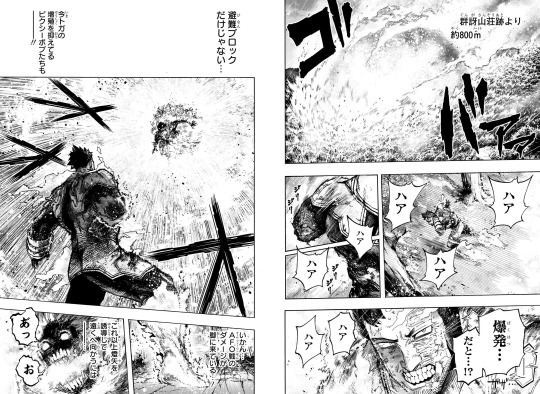
page 1
1-2
群訝山荘跡より約800m
ぐんがさんそうあとよりやく800メートル
gunga sansou ato yori yaku 800 MEETORU
Approximately 800 meters from the Gunga Mountain Villa Ruins
3-7
ハア
HAA
“Haah”
(Note: It’s the sound of heavy panting/breathing.)
8
爆発…
ばくはつ…
bakuhatsu...
“An explosion...”
9
だと…⁉︎
da to...!?
“you say...!?”
10-11
ハア
HAA
“Haah”
(Note: It’s the sound of heavy panting/breathing.)
page 2
1
避難ブロックだけじゃない…
ひなんブロックだけじゃない…
hinan BUROKKU dake ja nai...
It won’t just be the evacuation blocks...
2
今トガの増殖を抑えてるピクシーボブたちもーーー‼︎
いまトガのぞうしょくをおさえてるピクシーボブたちもーーー‼︎
ima TOGA no zoushoku wo osaeteru PIKUSHIIBOBU-tachi mo---!!
Also Pixiebob and the others who are suppressing Toga’s proliferation right now---!!
3
いかん…AFO戦のダメージが脚に来ている…!
いかん…オール・フォー・ワンせんのダメージがあしにきている…!
ikan...OORU FOO WAN sen no DAMEEJI ga ashi ni kite iru...!
This is bad...the damage from the battle with AFO is spreading to my leg...!
4
これ以上燈矢を誘導して遠くへ向かうにはーーー…
これいじょうとうやをゆうどうしてとおくへむかうにはーーー…
kore ijou Touya wo yuudou shite tooku e mukau ni wa---...
I have to guide Touya and lead him farther away---...
5
あっ
a
“AGH”
6
お
o
“OH”

page 1
1
おどおさん
odoosan
“FATHER”
2
見で
みで
mide
“WATCH”
3
見でええ
みでええ
mideee
“WAAATCH [ME]”
page 2
1
こんなのできるよぉになったんだぜ!
konna no dekiru yoo ni nattanda ze!
“I’ve become able to do something like this!”
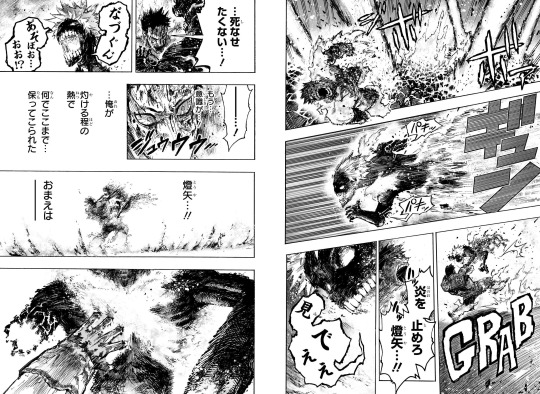
page 1
1
炎を
ほのおを
honoo wo
“The flames,”
2
止めろ
とめろ
tomero
“stop them!”
3
燈矢…‼︎
とうや…‼︎
Touya...!!
“Touya...!!“
4
見でええ
みでええ
mideee
“WAAATCH”
page 2
1
…死なせたくない…!
…しなせたくない…!
...shinasetakunai...!
"...I don’t want you to die...!”
2
なづぐん
nadzu-gun
“NATSU-KUN”
3
あぞぼお…おお⁉︎
azoboo...oo!?
“LET’S PLAY...YY!?”
4
もう…意識が…!
もう…いしきが…!
mou...ishiki ga...!
His consciousness...is already...!
5
…俺が
…おれが
...ore ga
...[Why have] I,
6
灼ける程の熱で
やけるほどのねつで
yakeru hodo no netsu de
with a heat that burns...
7
何でここまで…保ってこられた
なんでここまで…たもってこられた
nande koko made...tamotte korareta
Why have I...been kept here until this point?
8
燈矢…‼︎
とうや…‼︎
Touya...!!
Touya...!!
9
おまえはーーー
omae wa---
You---

page 1
1
死地での危機感
しちでのききかん
shichi de no kikikan
A sense of crisis at death’s door.
2
臨死の経験が"個性"を覚醒させる事がある
りんしのけいけんが"こせい"をかくせいさせることがある
rinshi no keiken ga “kosei” wo kakusei saseru koto ga aru
There have been cases where quirks have been awakened by near-death experiences.
3
その一方で人には
そのいっぽうでひとには
sono ippou de hito ni wa
On the other hand, people
4-5
「火事場の馬鹿力」というものがあり…
「かじばのばかちから」というものがあり…
「kajiba no baka chikara」 to iu mono ga ari...
have something like an insane strength of desperation...
(Note: This is the level of strength Izuku tapped into against Muscular the first time where he broke his body’s limiters. The typical example is of a mother lifting a car off her child in a moment of desperation.)
6
それは覚醒とは違い
それはかくせいとはちがい
sore wa kakusei to wa chigai
That’s different from an awakening.
7
死に瀕した時のみ顕現する力
しにひんしたときのみけんげんするちから
shi ni hin shita toki nomi kengen suru chikara
A power that manifests only when on the brink of death.
8
ああ…
aa...
“Yes...”
9
あああ!
aaa!
“I get it!”
page 2
1
冷の
れいの
Rei no
Rei’s
2
"個性"…‼︎
"こせい"…‼︎
“kosei”...!!
quirk...!!

page 1
1
勝って
かって
katte
I’ll win by
2
燈矢を見続ける!
とうやをみつづける!
Touya wo mitsudzukeru!
continuing to watch Touya!
page 2
1
全部
ぜんぶ
zenbu
“Everything”
2
俺の責任だ
おれのせきにんだ
ore no sekinin da
“is my fault.”
-4
全部背負って償いに生きねばと思っていた
ぜんぶせおってつぐないにいきねばとおもっていた
zenbu seotte tsugunai ni ikineba to omotte ita
“I thought I had to live and shoulder everything to make amends.”
5
でも
demo
“But”
6
おまえはずっと俺を見続けてたんだもんな…
おまえはずっとおれをみつづけてたんだもんな…
omae wa zutto ore wo mitsudzuketetanda mon na...
“you were always continuing to look at me...”
7-8
おまえを見てやれなかった……
おまえをみてやれなかった……
omae wo mite yarenakatta......
“I couldn’t see you......”
9
おまえにも償わなきゃいけなかったんだ
おまえにもつぐなわなきゃいけなかったんだ
omae ni mo tsugunawanakya ikenakattanda
“I needed to atone to you, too.”

page 1
1
同じ夢を見る俺だけがいない家族の夢
おなじゆめをみるおれだけがいないかぞくのゆめ
onaji yume wo miru ore dake ga inai kazoku no yume
I saw the same dream, the dream of my family without me only.
2
…一人で逝かせはしない…だが
…ひとりでいかせはしない…だが
...hitori de ikase wa shinai...daga
“...I won’t let you die alone...but”
3
もう誰も…!巻き込ませはしない
もうだれも…!まきこませはしない
mou dare mo...! makikomase wa shinai
“no one else...! We won’t involve [anyone else!]”
page 2
1
地上の移動では間に合わない
ちじょうのいどうではまにあわない
chijou no idou de wa ma ni awanai
They won’t evacuate the area above ground in time.
2
燈矢 おまえの火力も借りて空にーーー
とうや おまえのかりょくもかりてそらにーーー
Touya omae no karyoku mo karite sora ni---
Touya, I’m borrowing your firepower to [send us] to the sky---
3
待て…待ってくれ…!
まて…まってくれ…!
mate...mattekure...!
Wait...please wait...!
4
もう少しだけーーー!
もうすこしだけーーー!
mou sukoshi dake---!
Just a little more---!
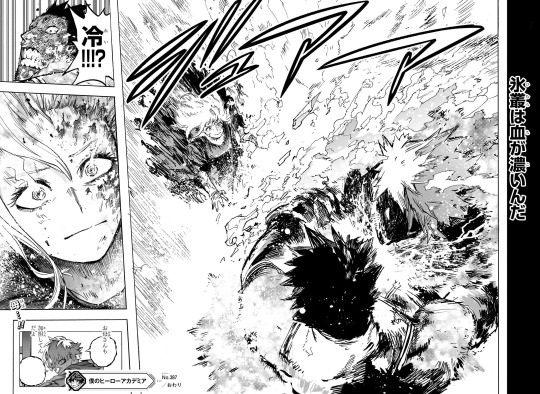
1
火叢は血が濃いんだ
ひむらはちがこいんだ
Himura wa chi ga koinda
The Himura blood runs thick.
2
冷!!⁉︎
れい!!⁉︎
Rei!!!?
“Rei!!!?”
3
お母さんも
おかあさんも
okaasan mo
You, too, Mom.
4
加担してんだよ
かたんしてんだよ
katan shitenda yo
You're complicit.
tagline
母…‼︎
はは…‼︎
haha...!!
His mother...!!
PLEASE DO NOT SHARE THIS POST AS A DIRECT LINK ON OTHER WEBSITES.
#please do not share this direct link on other websites#my hero academia manga spoilers#final showdown spoilers#won't properly tag until next week#wow that flashback to katsuki is sus#makin' it too easy for me to tie him in there horikoshi#will tag better later
150 notes
·
View notes
Text
"Himekuri Voice" Day 3 Myojin Yahiko
Koichi Makoto as Myojin Yahiko
“Tokyo fu Shizoku, Myojin Yahiko. Ore ha wappo janee”
“I’m Myojin Yahiko, a Tokyo Shizoku. I’m not a kid!!”
8 notes
·
View notes
Text
@liroyalty
KEEP GOING
OKAY BUT IMAGINE!!!!
It's the late Edo period and The Black ships arrive, basically forcing the Shogunate to open up the borders to the country to not just one, but THREE different countries, and not just like... the Dutch down south....
The Ishikawas see this and go "Oh shit these guys are so interested in our culture and our goods," and sidle up to them like "Hello we're here to do business with you" as opposed to other factions who weren't about this shit at all. The Ishikawas were already a wealthy merchant family, and as the so-called "barbarians" had no ill will toward merchants, as many of them, and their cultures, merely see it as another profession, they get along great, hosting them, exchanging the language and culture, arranging alliances with soldiers and politicians just by being open and willing to show them all a good time, which they have the money to do.
It's all about investments, after all.
Fabric sales and the sales of artisan goods have been their oldest trade, and the silks and the beautiful brocade of kimono caught the foreigner's attention, so that was what started their trades with certain members of delegations from Britain and America.
As the Bakamatsu period grew heated, and as a certain Sakamoto Ryoma was arranging the exchange of power from the Shogunate back to the Emperor, the Ishikawas solidified plans to send a few sons to the other countries if there were problems for them to continue business, and they did move toward those plans, though they were not permanent situations.
The Meiji Restoration saw the dissolution of the samurai class, which was a dizzying turn of events. Many prominent families were suddenly without power, and those who "at least had their honor" had not even that, mourning the loss of their top knot and their sword, and were called shizoku, removing even the term samurai from their lives.
Meanwhile, the Ishikawas were enjoying the benefits of their investments. Political ties and trade with foreign nations allowed the family to grow new branches, and the Ishikawa Zaibatsu was formed. It enjoyed prominence until the dissolution of zaibatsu during the Second World War, but the Ishikawa's business now operates as a keiretsu, with the three boys holding the biggest branches. Asami is preparing his son to take over, but he currently runs the holding bank. Ayato holds the fabric manufacturing and trading branch, which is the oldest business in the family, and Akira runs their mobile and electronic branch, newest by far but growing exponentially by the decade.
#it's just how I am;; (headcanon)#how's that for some family history??#tldr: the ishikawas were wealthy merchants and opportunists who ended up making serious bank when the samurai were taken out of power#liroyalty
3 notes
·
View notes
Text
Where to Purchase the Manga for Irregular at Magic Highschool (Japanese Raw) Part 2
(Ongoing) Mahouka Koukou no Rettousei - Shizoku Kaigi-hen (LN 17-19): Digital Volumes: 1 2 3 4 5 Physical Volumes: 1 2 3 4 5, Full Set. New Chapters are released monthly in GFantasy you can find the latest chapter here (digital) or here (physical)
(Ongoing) Mahouka Koukou no Rettousei - Nankai Soujou-hen (LN 20) Digital Volumes: 1 2 Physical Volumes: 1 2 New Chapters are released monthly in Dengeki Daioh you can find the latest chapter here (digital) or here (physical)
Honor Student
*(Complete) Season 1 (Offical English Translation): Digital Volumes: 1 2 3 4 5 6 7 8 9 10 11 Physical Volumes 1 2 3 4 5 6 7 8 9 10 11
(Ongoing) Season 2: Digital Volumes: 1 2 Physical Volumes 1 2, Full Set. New Chapters are released monthly in Dengeki Daioh you can find the latest chapter here (digital) or here (physical)
Plan to Assassinate Tatsuya Shiba
(Ongoing) Digital Volumes: 1 2 3 4 Physical Volumes: 1 2 3 4, Full Set. New Chapters are released monthly in Comic Alive you can find the latest chapter here (digital) or here (physical)
Cygnus Maidens
(Ongoing) Digital Volumes: 1 2 Physical Volumes: 1 2, Full Set. New Chapters are released monthly in Comic Alive you can find the latest chapter here (digital) or here (physical)
The Irregular at Magic High School The Movie: The Girl Who Summons The Stars
(Complete) Digital Volumes: 1 2 Physical Volumes: 1 2, Full Set
Mahouka Koukou no Rettousei - Yonkoma Hen
(Complete) Digital Volumes: 1 2 3 4 5 6 7 Physical Volumes: 1 2 3 4 5 6 7, Full Set
Updated as of June 2022
#mahouka koukou no rettousei#the irregular at magic high school#manga#rawmanga#anime#japan#japaneese#magic#tatsuya shiba#miyuki shiba#light novel#amazon
2 notes
·
View notes
Text
Datos sobre samuráis
¿QUÉ SIGNIFICA LA PALABRA SAMURÁI?
La palabra samurai procede del término saburau, que en japonés antiguo significa “servir”. De aquí deriva saburai, “aquellos que sirven”, que finalmente se convirtió en samurai.
¿QUÉ DESIGNABA EL TÍTULO DE SAMURÁI?
El término samurái no se refiere a un rango militar, sino a un estatus social: los samuráis eran una clase social con ciertos privilegios, como el derecho a portar armas, así como obligaciones militares para con los señores feudales que gobernaban Japón.
¿CUÁNDO APARECEN POR PRIMERA VEZ LOS SAMURÁIS?
La primera referencia que tenemos a los samuráis data de principios del siglo VIII, durante los últimos años de la era Asuka (552-710 d.C.). Después de una guerra contra China, se realizó una reforma que establecía las diversas clases de burócratas imperiales, incluyendo a los saburai.
ORIGINALMENTE, ¿QUÉ ERAN LOS SABURAI?
En sus inicios, los samuráis no eran guerreros sino funcionarios civiles que se ocupaban de diversos asuntos relacionados con el funcionamiento del Estado.
EN EL SIGLO IX, LOS SAMURÁIS APARECEN POR PRIMERA VEZ COMO GUERREROS (BUSHI). COMBATÍAN CON:
Aunque los asociemos con el combate cuerpo a cuerpo, el arma principal de los primeros samuráis era el arco, que complementaban con diversos tipos de espadas.
DURANTE SUS PRIMEROS SIGLOS DE HISTORIA, LA ESPADA CARACTERÍSTICA DE LOS SAMURÁIS SE LLAMABA:
La tachi fue la espada más usada durante gran parte de la historia de los samuráis, desde su creación alrededor del año 900. La kodachi, cuyo nombre significa “pequeña tachi” era una versión reducida de esta. Durante el periodo Muromachi (1336-1573) las tachi fueron gradualmente sustituidas por la katana, más fácil de manejar en el combate cuerpo a cuerpo debido a que era más corta y menos curvada.
LOS SAMURÁIS TAMBIÉN USABAN ARMAS DE FUEGO
Desde su contacto con los portugueses en el siglo XVI. El daimyô (señor feudal) Oda Nobunaga fue el primero en reconocer su utilidad y equipar a sus tropas con mosquetes, lo cual le permitió expandir su poder a costa de otros señores feudales.
¿CUÁNDO SE ABOLIÓ EL TÍTULO DE SAMURÁI?
El título de samurái fue abolido a principios de la era Meiji (1868-1912), junto con los privilegios que conllevaba (entre otros, el de llevar espada). Los antiguos samuráis fueron integrados dentro de una nueva clase llamada shizoku, sin ningún privilegio especial más allá del título.
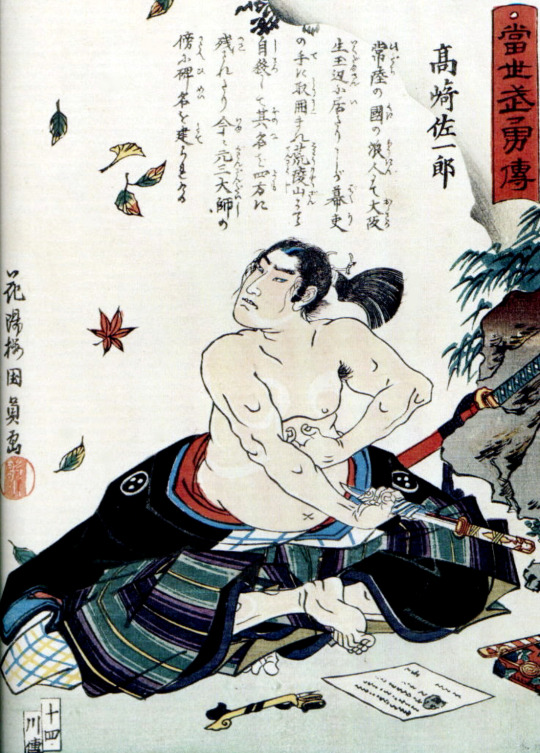
0 notes
Text
Timo Klemola Karate-do, tie ja taito: "Gichin Funakoshi syntyi Shurissa. Okinawalla vuonna 168. Hänen isänsä Gisu Funakoshi oli virkamies ja bo-ekspertti. Meiji-hallinto, joka syntyi Funakoshin kanssa saman vuonna, toi mukanaan koko joukon uudistuksia. Sen lisäksi että samurai-luokka lakkautettiin, annettiin myös määräys, että miesten piti leikata pois nutturansa. Varsinkin Okinawalla nutturaa pidettiin kypsyyden ja miehuuden symbolina, ja määräys herätti laajaa vastustusta. Opiskellessaan kansakouluopettajaksi Funakoshikin joutui siitä luopumaan. Käydessään kotonaan vanhempiaan katsomassa - nyt ilman nutturaa - hänen isänsä huusi: >>Mitä hittoa olet mennyt tekemään itsellesi - sinä, samurain poika!>> ja hänen äitinsä pakeni takaoven kautta vanhempiensa kotiin. Hän oli syntynyt samuraita vastaavaan shizoku-luokkaan. Jo pienenä hänen isoisänsä opetti hänelle kiinalaisia klassikoita : kungfutselaista ja taolaista filosofiaa. Shikozu-pojalle sitä pidettiin tärkeänä. Nuorena Funakoshi oli sairaalloinen ja heikko. Hänen vanhempansa veivät hänet Azato Yasuzunen luo saamaan oppiakaratessa. Hänen terveytensä alkoi parantua, ja harjoiteltuaan useita vuosia Azaton, Itosun, Arakakin ja Matsumuran johdolla, hänestä kehittyi taidossa mestari. Hän kertoo harjoittelustaan elämänkerrassaan näin: "Siihen aikaan hallitus oli kieltänyt karaten harjoittelun ja harjoittelu oli pidettävä salassa, ja oppilaita kiellettiin ankarasti puhumasta kenellekään siitä, että he harjoittelivat karatea ... karatea voitiin harjoitella vain salaa öiseen aikaan. Azaton talo oli kaukana isovanhempien talosta, jossa tuohon aikaan asuin, mutta kun aloin innostua karatesta, tuo öinen matka ei koskaan tuntunut liian pitkältä. Parin vuoden harjoittelun jälkeen huomasin , että terveyteni oli parantunut huomattavasti enkä enää tuntenut itseäni heikoksi. Nautin karateharjoittelustani, se oli tehnyt minusta terveen, ja siihen aikaan aloin vakavasti ajatellea karate-dota elämäntapana.""
0 notes
Video
youtube
New song from Limi! =D
Music: Limi.
Lyrics: Li, Adam Shih, 林于天 Shizoku Lin.
Arranger: Mi. Guitarist: 林庭鈺 Ting.
Background Vocal: Li. Vocal Producer: Li.
Producer: Limi, 楊大緯 Dave Yang. Graphic Artist: 低級失誤 Saitemiss
By the way, they posted a photos of Li & Mi yesterday along with details for the album release show, check it out HERE.
One more thing, they’re premiering a new MV tomorrow (Saturday), so stay tuned...
#Limi#limimusic#Limi tw#楊大緯 Dave Yang#林于天 Shizoku Lin#Adam Shih#林庭鈺 Ting#低級失誤 Saitemiss#taiwan#music video
9 notes
·
View notes
Text
Who Is Higuchi Ichiyou? (Spoilers if you haven’t fully watched/read Bungou Stray Dogs)
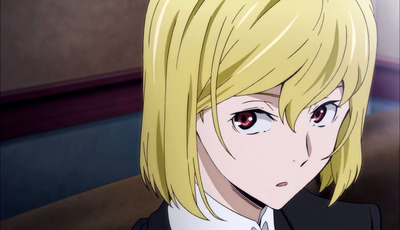
Higuchi Ichiyou, a port mafia member and the one who commands the Black Lizards. She isn’t respected by the mafia, she isn’t useful to the mafia ability wise but why is she here?
Let us begin from the beginning.
Who is the real life Higuchi Ichiyou?
She was born on May 2, 1872 in a nagaya (row house) on the premises of the Tokyo prefectural office (present Chiyoda Ward, Tokyo Prefecture) in Uchisaiwaicho, Ichi shoku, Daini daiku, Tokyo-fu (Tokyo Prefecture). Her real name was Natsu HIGUCHI. Her father was Tamenosuke (Noriyoshi) HIGUCHI and her mother was Ayame, the fifth daughter of the Furuya family; Ichiyo was their second daughter. She had an older sister (Fuji) and two older brothers (Sentaro and Toranosuke), and was followed by a younger sister (Kuni). Making Higuchi Ichiyou the fourth child.
Her father, Noriyoshi, was a peasant in Nakahagiwara Village, Yamanashi County, Kai Province (present Koshu City, formerly Enzan City). Her grandfather seems to have been familiar with creative writings such as haikai (seventeen-syllable verse) and keisho (the most important documents in Confucianism); it is said that Noriyoshi preferred academics to farming and, as his marriage with Ayame was not permitted, they practically eloped to Edo. Noriyoshi began as a servant in the Bansho shirabesho (a government-run Western studies education and research institute) and, by good fortune, became a jikisan (immediate retainer) of the bakufu (Japanese feudal government headed by a shogun) by buying a kabu (a right to become doshin) of doshin (a low-ranked official) in 1867. After the Meiji Restoration, he became a low-level official and acquired the status of shizoku (a family or person of samurai ancestry), but was dismissed in 1876. After that, he made a living by working as a real estate broker and similar things.
As a young child, Ichiyo was raised in a family of moderate means, and she enjoyed reading from the time she was small; she read kusazoshi (illustrated story books) and it is said that she read through "Nanso Hakkenden" (a story of eight samurai and a princess of the Satomi family in the Nanso region) by Bakin KYOKUTEI when she was seven years old. In 1877, she entered Hongo Shogakko (Hongo Elementary School), but could not continue because she was too young, so she enrolled in Yoshikawa Gakko (Yoshikawa School), which had been established privately by Tomikichi YOSHIKAWA. In 1881, Toranosuke, her second older brother, set up a branch family and apprenticed himself to an earthenware painter. The family moved to Okachimachi, Shitaya Ward in the same year, so in November, she transferred to Seikai Gakko, a private school, in Ueno Motokuromoncho. She graduated from the fourth grade of the advanced course at the top of her class, but left the school without advancing to the upper grades. It is said that this was because her mother, Ayame, believed that studies were unnecessary for women.
On the other hand, it is said that her father, Noriyoshi, recognized his daughter's literary talent and let her learn waka from his acquaintance, Shigeo WADA. In 1886, she entered the waka school 'Haginoya,' run by Utako NAKAJIMA, through an introduction by Choan TODA, an acquaintance of her father from the days of the Tokugawa shogunate. In this school, besides waka, she studied classic literature and Japanese calligraphy of the Chikage school; dynastic style literature, such as The Tale of Genji, was the motif of Ichiyo's early works. During her time at Haginoya, Ichiyo met her close friends Natsuko ITO and Tatsuko TANABE and gave lectures as an assistant teacher. At that time, Haginoya was a waka school attended by the wives and daughters of the former regime's privileged classes - such as court nobles, former roju (senior councilor of the Tokugawa shogunate), and former domain lords - and of the Meiji government statesmen and military personnel. Although Ichiyo was shizoku, since her family had been farmers, she was treated as a commoner; she became introverted, and senior pupils from the upper social class called her 'monotsutsumi no kimi' (literally, close-natured person). When the first annual New Year's opening ceremony since Ichiyo had entered the school drew near, the topic of conversation among the well-bred young ladies turned to clothing and festive dress, well beyond the range in which the daughter of a low-class government official could compete. However, she quashed her feelings of inferiority and attended the ceremony wearing old clothes that her parents had borrowed.
Ichiyo's family moved frequently; Ichiyo moved twelve times in her life. In 1888, Sentaro, the first son and head of the family, died; Ichiyo inherited the family and became its head, with her father as guardian. In 1889, Noriyoshi's attempt to establish an association of draying contractors failed, and he died in July of the same year.
Ichiyo's engagement to her fiance, Saburo SHIBUYA, was cancelled. It is said this was due to the fact that, although the Higuchi family was left with a large amount of debt after Noriyoshi's death, Saburo HIGUCHI required a large amount of yuinokin (betrothal [gift] money). At the age of 17, Ichiyo was forced to support her family as its head and, in 1890, she lived in the house of the Nakajima family as a Haginoya apprentice. In September of the same year, she moved to Kikuzaka, Hongo (Bunkyo Ward, Tokyo Prefecture) and, along with her mother and younger sister, was obliged to live a hard life doing needlework and araihari (washing, stretching and drying various parts of kimono). It is said, however, that Ichiyo herself tended to disdain labor, and that the needlework and araihari were conducted by her mother and younger sister.
As Ichiyo's nearsightedness made her bad at detail work, she searched for other ways to earn income. When she learned that Kaho TANABE, a pupil in the grades ahead of her, had obtained a large manuscript fee for her novel "Yabu no Uguisu" (literally, Bush Warbler in a Thicket), Ichiyo made up her mind to write novels. At the age of 20, she wrote 'Kareobana Hitomoto' (Withered Grass). She used her pen name 'Ichiyo' for the first time in an essay written that same year. In order to make a living as a novelist, she also studied under Tosui NAKARAI, who reported on novels for the Asahi Shimbun, frequented a library, and published her first novel 'Yamizakura' (literally, Cherry Blossom in the Dark) in the first issue of the magazine 'Musashino,' presided over by Tosui. Afterwards, Tosui continued to take care of Ichiyo, who lived in dire poverty. Gradually, Ichiyo began to have amorous feelings for Tosui. However, a scandal about their relationship spread (although both were single, the customs of the time did not approve of such associations between a man and a woman without the intent to marry), and so she severed relations with Tosui. As if to emphasize the end of her relationship with Tosui, she published "Umoregi" (literally, Buried Wood), an idealistic novel in the style of Rohan KODA; it was completely different from her previous works, and it became the one that made her career.
Ichiyo became acquainted with Toson SHIMAZAKI and Tokuboku HIRATA, both of whom were well-versed in European literature; having come into contact with naturalistic literature, Ichiyo published multiple works including 'Yuki no Hi' (literally, Snowy Day) in 'Bungakukai.'
Her former fiance, Saburo SAKAMOTO (the Saburo SHIBUYA mentioned above) had become a prosecutor; around this time, he proposed to her, but she refused him. In order to relieve her straightened circumstances, she opened a variety shop which sold cleaning implements and penny candy in Shitaya Ryusenji-cho (present Ryusen 1-chome, Taito Ward), but closed the shop in May 1894 and moved to Maruyama Fukuyama-cho, Hongo Ward (present Nishikata 1-chome). Her experience on this occasion later became the subject of 'Takekurabe,' her representative work. She continued writing. In December, she published 'Otsugomori' (literally, New Year's Eve) in 'Bungakukai' and the next year, in 1895, 'Takekurabe' was published in seven installments, beginning in January.
Between the two works, she published 'Yuku Kumo' (literally, Going Cloud), 'Nigorie,' 'Jusanya' and others; the period from 'Otsugomori' to 'Uramurasaki' (literally, Purple on the Verso) is called her 'miraculous 14 months.'
In 1896, when 'Takekurabe' was published in its entirety in 'Bungei Kurabu,' it won great acclaim from Ogai MORI, Rohan KODA and others; Ogai MORI praised Ichiyo very highly in 'Mezamashigusa,' and many members of 'Bungakukai' began to visit her. In May, she published 'Warekara' (literally, From Myself), and 'Tsuzoku Shokanbun' (literally, Popular Epistle) in "Nichiyo Hyakka Zensho" (literally, The Daily Encyclopedia). Ichiyo had advanced tuberculosis and, when she was diagnosed in August, it was judged hopeless. On November 23, she died at the age of 24 years and 8 months. Ichiyo's life as a novelist lasted only a little over 14 months and in 1897, the year following her death, "Ichiyo Zenshu" (literally, The Complete Collection of Ichiyo's Works), and "Kotei Ichiyo Zenshu" (literally, The Revised Complete Collection of Ichiyo's Works) were published.
Her grave was in the annex temple of Tsukiji Hongan-ji Temple, the Higuchi family's ancestral temple, and was later moved to the Wadabori byosho (mausoleum) of Nishihongan-ji Temple in Izumi, Suginami Ward. Her homyo (posthumous Buddhist name) in Jodo Shinshu sect (the True Pure Land Sect of Buddhism) is Choshoin Shaku Myoyo. Literary materials including handwritten manuscripts and other related materials are kept by the Museum of Modern Japanese Literature and Yamanashi Kenritsu Bungakukan (literally, Yamanashi Prefectural Museum of Literature). Since November 2004, her portrait has been used on the Bank of Japan's five thousand yen note.
Now that we know her real life counterpart lets review her anime/manga self.
As a mafioso, Higuchi proves ruthless and fearsome, not shying away from killing her targets. When confronted by the enemy, she has a distant atmosphere to herself, often strictly no-nonsense and showing little sympathy for them. Quick to act, she seldom tolerates disrespect and detests those who underestimate Port Mafia.
However, Higuchi's personality, as her boss and she herself notes, is rather unfit in the Port Mafia. Beneath her tough exterior, she is easy to upset, hesitant, and quick to question herself. She even contemplated leaving several times, despite the inevitable hardships defection foretold. As a result, her subordinates seldom show her respect, many following her orders out of fear of Akutagawa's wrath. An impulsive spirit also leads her to tend toward drastic measures, consequently going against orders.
Her biggest weakness is her intense, bordering obsessive loyalty to Ryunosuke Akutagawa, whom she obeys almost unconditionally. She often insists on filling in for Akutagawa, worried about his poor health. Unfortunately, her loyalty is met with a frustrated Akutagawa's abusive and harsh treatment, often being called "unnecessary" to him. Nonetheless, Higuchi remains loyal to him. Her instinct to tell Akutagawa everything she knows ends up a key component to luring Akutagawa to the Guild's Moby Dick. However, Higuchi makes up her weaknesses for having a strong resolve, and she refuses to turn away when allies, especially Akutagawa, are in danger.
Thankfully, her determined and honest nature earns her Black Lizard's respect. She proves reliable and incredibly brave, even if her judgment is easily clouded under pressure. Even if questioning her position in the mafia, Higuchi shoulders its burdens and responsibilities to this day, understanding its vital role in Yokohama's safety. She also makes it a point to not be unnecessarily cruel to her opponents, acting strictly professional in Akutagawa and Port Mafia's names.
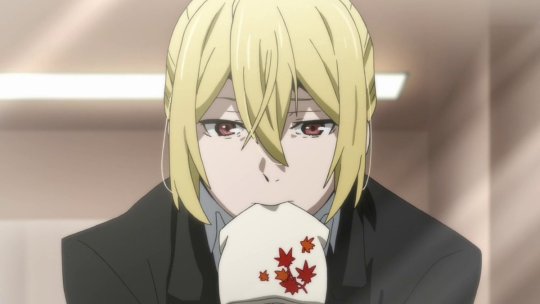
Her composure can often waver. Sometimes she is cool-headed and intimidating, other times easily unsettled and stressed out. Ultimately, she seems to excel more in covert operations than the frontlines, as a tendency to panic leaves her wide open in battle.
Higuchi however has some...strange relationship with the boss however. And this is mostly with what was already established above that the real life Mori Ougai had praised her work which made her very popular. So far in the anime there are three people who Mori Ougai seems close with;
Fukuzawa Yukichi, Yosano Akiko and Natsume Soseki.
Ogai MORI (February 17, 1862 - July 9, 1922) was a novelist, critic, translator, playwright, surgeon of the Imperial Army and Bureaucrat (Senior Official First Class). He was also Army Surgeon General (equivalent to Lieutenant General), Shoshii (Senior Fourth Rank), Order of Merit Second Class, Ko Third Grade, Doctor of Medical Science and had a doctorate in Literature. He is considered one of the great writers of the post-First World War Period ranked alongside Soseki NATSUME. His real name was Rintaro. He was born in Tsuwano Domain, Iwami Province (present Tsuwano-cho, Shimane Prefecture). He graduated from the University of Tokyo, Faculty of Medicine.
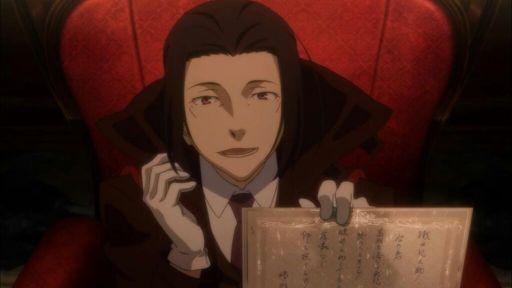
Shiyo Ho was born as the third daughter of Soshichi HO (father) and Tsune (mother) who ran a long-established Japanese confectionery shop 'Surugaya' in Kaino-cho, Sakai City (present-day Kaino-cho, Sakai Ward), Osaka Prefecture. One of her real brothers was Hidetaro HO who later became an electrical engineer. Shiyo entered a school of Sinology (the study of the Chinese classics) at the age of nine and also learned koto (a long Japanese zither with thirteen strings) and shamisen (a three-stringed Japanese banjo). After entering Sakai Girl's School (present-day Osaka Prefectural Senyo Senior High School), she devoured the Japanese classics such as "The Tale of Genji." In addition, she said, under her elder brother's influence, 'by the time I was twelve or thirteen, my greatest pleasure was reading literary magazines "Shigaramisoshi" (and later its successor "Mezamashigusa") and "Bungakukai" as well as novels by Koyo OZAKI, Rohan KODA, and Ichiyo HIGUCHI' ("Myojo" May 1906).
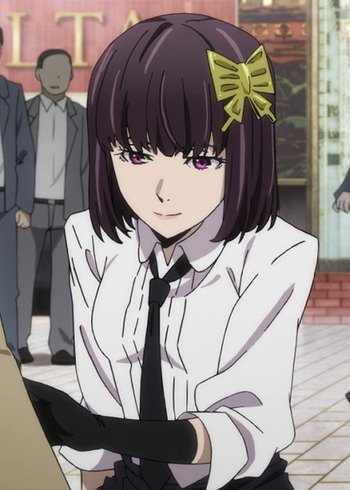
Around the age of twenty she started contributing her poems to magazines while she helped her family business. After participated in the Kansai Young Men's Literary Society, in 1900, she became acquainted with a waka poet Tekkan YOSANO at a poetry reading held at a Japanese-style hotel in Hamaderakoen and contributed her poem to "Myojo," an in-house magazine of Shinshisha (New Poetry Society) founded by Tekkan. In the following year she left her home and moved to Tokyo, and published her first poetry anthology "Midaregami" (Tangled hair) that expressed female sensuality in open fashion with which she established her style as a romantic poet. Later she married Tekkan.
In September 1904, she published a poem "Kimi Shinitamou koto nakare" (Thou Shalt Not Die) in "Myojo." In 1911, she contributed a poem that started with 'Yama no ugoku hi kitaru' (The day comes when a mountain moves) to the first issue of "Seito," the first female literary magazine in Japan. In 1912, Akiko followed Tekkan and moved to Paris, France. Ogai MORI helped her to raise money for going abroad with his wide range of literary works and large circle of contacts, and he also proofread "Shinyaku Genji Monogatari (New Translation of The Tale of Genji)" on behalf of Akiko to which he wrote the preface. On May 5, 1912, the Yomiuri Shimbun started a series of articles entitled 'Atarashii Onna' (New Women) with an article on Akiko's voyage to Paris, and on the following day the newspaper reported her departure (some 500 people including Raicho HIRATSUKA saw her off). The following June issue of the "Chuo koron" magazine ran a feature story on Akiko. On May 19, Akiko arrived in Paris via the Trans-Siberian Railway; during four months up to her leaving to Japan from Marseille, France on September 21, she visited England, Belgium, Germany, Austria, and the Netherlands and so on.
The same like Higuchi Ichiyou, Fukuzawa was praised for his work and put on the Japanese bill. Fukuzawa is respected and is still friends with Mori as evident in season 3 episode 9 where he said after leaving Lucy “I’m going to visit an old friend”.
Despite the many things Fukuzawa witnessed Mori do (which includes mentally abusing Yosano to have her ability of usage for the mafia) Fukuzawa still sees Mori as a friend and that is seen back with how Mori and Fukuzawa fought.
They both went for the more vital points of their body. Making their death quick and painless so that one cannot suffer compared to the other. Even when Pushkin was caught, the two had one brain cell in that moment and both punched the virus ability user.
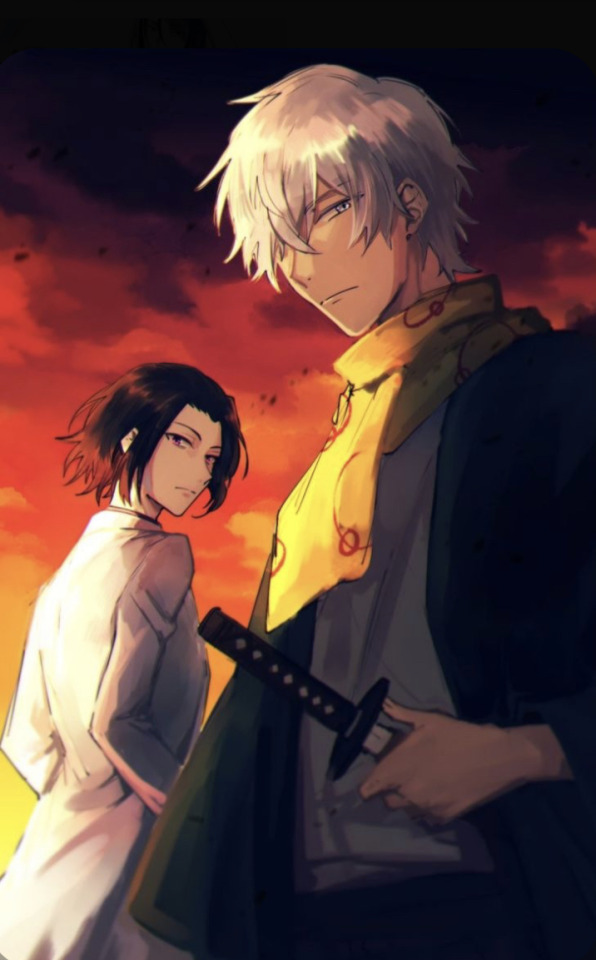
Why are Fukuzawa, Yosano and Natsume relevant you might ask? Well, let’s address the elephant in the room.
Let’s dissect season 1 episode 11 first (chapter 14 in the manga.)
We begin with how Mori Ougai is introduced, which is through Higuchi. After the failure that is capturing Atsushi and selling them for 4 billion yen/dollars Higuchi reports to Mori about their failure. This scene made me, a fan of the irl Mori Ougai’s work, open my eyes and ears to see how the two interact:
Higuchi: “I’m truly sorry for this.”
Mori: “Maybe he’ll never regain consciousness.”
Higuchi: “No way!”
Mori: “Don’t worry. You two have done you’re best. It’s true that you failed in the assault of the armed detective agency, erred during the capture of the man-tiger and sank the freighter along with our cargo. But you’ve done your best, and that’s all that mattered. Making effort is the most important. Results only come second, isn’t that right?”
Higuchi: “....”
Mori: “Oh, yeah. The trafficking company Akutagawa destroyed during the mission...the Remnants of Karma Transit seems to be recruiting. They’re probably planning to take revenge on Akutagawa.”
Higuchi: “what?”
Mori: “Listen, Higuchi-kun. The mafia is essentially an economic body that uses violence as its currency. It doesn’t matter at what got sunk or who got killed but if that violence is returned to us, all our expenses will become liabilities.”
Higuchi: “How could you call those liabilities? They were the fruits of of Akutagawa-senpai’s efforts up until now!”
Mori: “Indeed. Akutagawa-kun is highly capable. His violence is outstanding even in the mafia. **But what about you?** “
Higuchi: “....”
Mori: “Higuchi-kun. Have you ever wondered whether this job is really suited for you?”

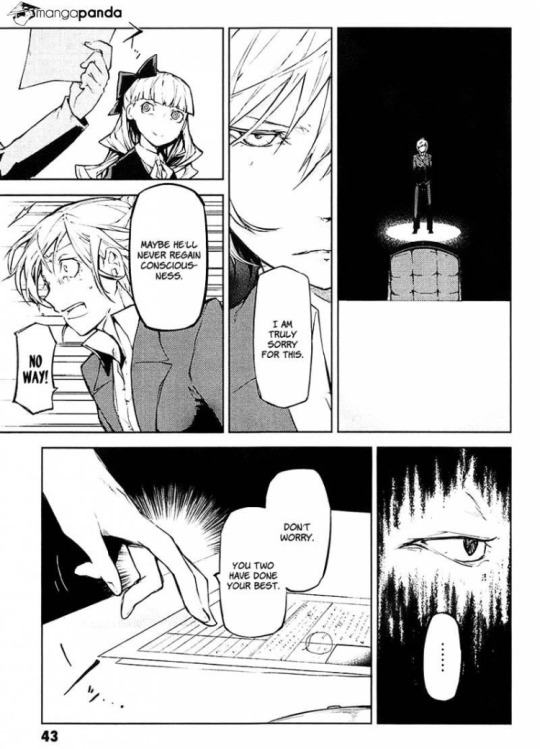
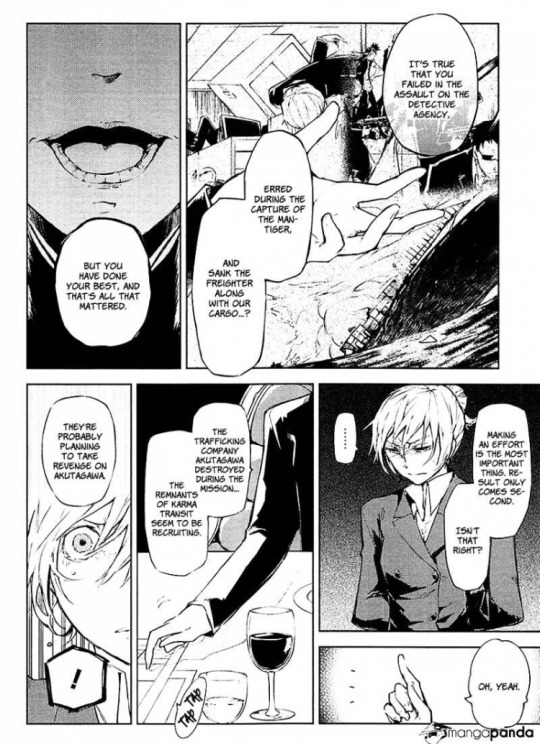
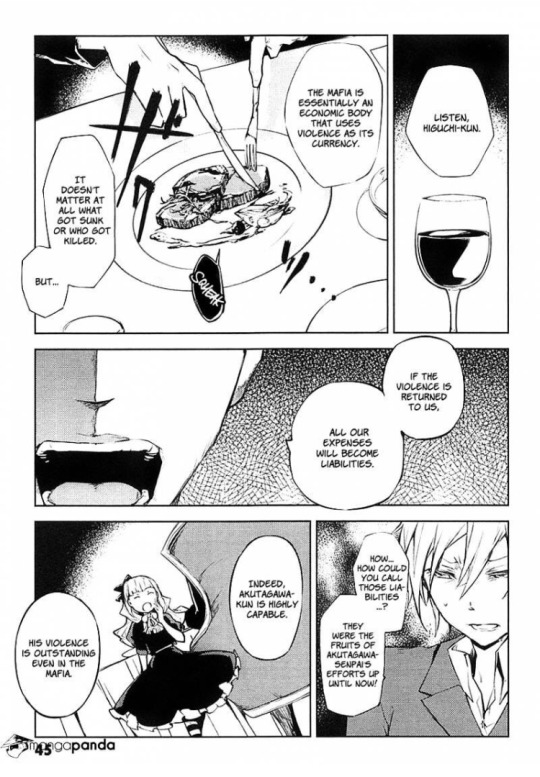
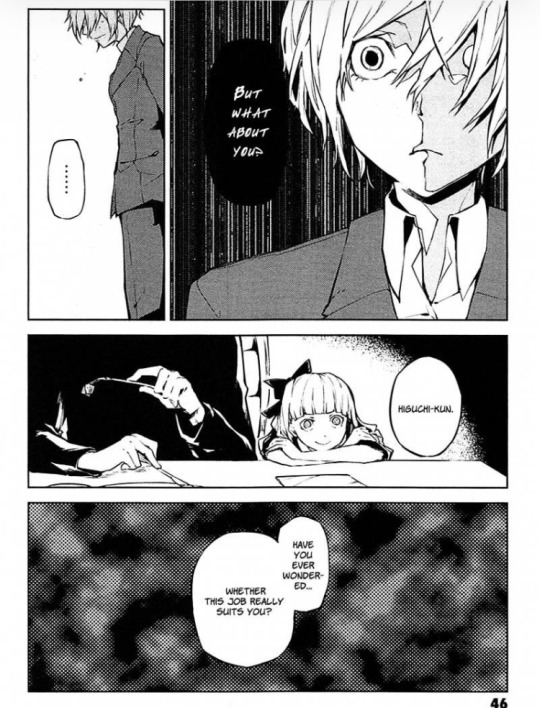
From what we have seen so far, Mori doesn’t seem angry at her actions. In fact, he seems more disappointed but with a hint of worry. Knowing real life mafia bosses, Higuchi would either get fired or tortured for her failures, yet she is here standing without any injuries. This is the most seen in the anime where Higuchi clearly is talking back to Mori, talking back to the king of the underworld.
The next scene is with the Black Lizards.
Tachihara: “This bastard Gin is always put onto sneaky jobs like infiltration and assassinations. Slitting the throats of families and friends on the higher ups order is quite a usual task. If he had meant it, you wouldn’t even have the time to gape.”
Higuchi: “Did the boss say he wanted me dead?”
Hirotsu: “Not yet, but who knows what will happen in the future.”
Higuchi: *cold face* “So you have come here to mock me?”
Hirotsu: “We’re only here to warn you to stay alert. If I were you I would come up with an insurance plan before the hitman starts closing in. The higher ups aren’t the only ones who are after your head. You and Akutagawa are the Guerrilla Squad directly under the boss’ command, giving you the authority to mobilize us in the combat squad, so your technically our superiors. However we don’t obey you out of your authority, but out of fear and respect for Akutagawa’s ability. Higuchi-kun, now that Akutagawa is out of action what power do you posses to make us obey you?”
Throughout the whole entire scene they say that Higuchi, despite her position as their superior, has not much authority over them. The only reason why they follow her is because she is under Mori’s direct order, so she and Akutagawa are second closes to Mori next to the executives.
Yet why is she here if she isn’t that important to the mafia according to the Black Lizards?
In the next page we see that she is against Mori’s order. Higuchi is going against Mori’s orders. This is a giant red flag because she is directly not following Mori’s order; this is enough to get executed under mafia rules yet she isn’t. How? How is she allowed to go through with this?
Let’s look further:
“But the only reason I never actually did it...”
“It’s not easy to break away from the mafia, but it’s not impossible.”
Let’s take the first sentence. She never finished it. She never said the reason why she never left. All we see is her remembering Akutagawa. This could mean one of two things; 1, she is in love with Akutagawa and wants to protect him or 2. She admires him for him using his ability more efficiently compared to her.
You might be asking, how did we go from Akutagawa to Higuchi’s ability? That’s simple.
Let’s remember Tachihara for example. At first we thought he wasn’t an ability user like Gin but it was later on revealed that his ability, Midwinter Memento, allows him to manipulate metal. While it has nothing in common, the name and the ability itself, this can be the same for Hirotsu.
Which means that authors have abilities, and Higuchi Ichiyou isn’t just some author. She is the first ever female author that got so high as being on a yen bill. So her not having an ability is rather suspicious.
Not only that but let’s look at how the novel 55 minutes describes her:
The novel described Akutagawa as an ability user, how would Higuchi not be described as a non-ability user? Because she is an ability user.
Which brings us back to the first take. Many mafioso’s would get in trouble for going against Mori’s word. With Higuchi it is differently; in season 1 episode 11 you see that Higuchi was talking to Mori on a rather even note, her eyes shined a few times which means that she appreciates the praises but she still went against his word by saying “Akutagawa has done so much to be considered a liability.” She talked back against the boss, that would be considered a punishment in the underground yet Mori kept her. This is also shown in the manga where in the mall, Higuchi talked once again back against him but Mori warned her as if she was a child that wants to know more about her birthday present.
Compare this to how he talks to Hirotsu; a mafioso who is longer in the mafia compared to Mori.
He talked back to him and he got a glare and was questioned “what do you want to say?” In a threatening type of way. Knowing Mori, it isn’t because of the former boss because Mori doesn’t care about him anymore nor is it about Dazai taking his place, that is his main goal.
My theory is that Higuchi’s ability is that big of a liability that she is Mori’s secret weapon.
In season 1 episode 11 she keeps saying “it is difficult to leave the mafia but the reason I stayed is because...”
She never finished her sentence. She never told the full reason why she stayed. In the manga we are shown that she isn’t respected, that subordinates walk over her. Yet even with these facts, Higuchi isn’t fired.
She also says “it is difficult to leave the mafia but it isn’t impossible”
That is a lie because as we have seen with Kyōuka it is impossible. How does Higuchi have such privilege? Because Mori knows she will come back. The reason why in her monologue it showed Akutagawa is because she admires him for being able to control Rashoumon, the same way how Atsushi finds Akutagawa amazing for being able to control Rashoumon.
Mori favors her, and this is shown in a panel in Wan where Higuchi does an impression of Mori when he is with Elise yet instead of being angry at Higuchi, Mori directs his glare to Chuuya and Tachihara. There is also a chapter where Tachihara, Higuchi, Akutagawa and Gin destroyed the Black Lizard hideout but instead of punishing Higuchi (who was the source of the accident) he punished them all.
Let’s look at another thing; how close is Higuchi with Mori?
Season 2 episode 8 where Mori was stabbed by Fyodor. It was brief but we see Higuchi together with the boss. Out of everyone in the mafia; Kouyou, Chuuya, Kajii hell even Akutagawa could (but he was busy looking for Nathanial) it was the least respected mafioso. Not only that but Higuchi back in season 2 gave information that the boss gave personally to Higuchi to send to Dazai.
This could have also been done by Hirotsu or Gin who know Dazai the longest. But something caught my attention. Higuchi said “I researched your history.” This wouldn’t seem bad was it not that Mori keeps Dazai’s executive position open for him to return, so Dazai is still technically an executive. ONLY EXECUTIVES are allowed to learn the history of the other executives. Gin, Hirotsu, Akutagawa, Kajii, Chuuya and Kouyou know about Dazai because they have an actual history with him but Higuchi is an outsider of this. She is like the other mafioso who aren’t related to Dazai yet she did research on him, which isn’t allowed.
Now this might sound as if Higuchi is special but let’s look at something or more someone who also didn’t look special but actually is special; Tachihara Michizo.
On the surface, Tachihara is an arrogant, impulsive, rash individual, more than willing to solve problems through sheer brute force and his dual guns. A violent temper leads to frequent conflict between him and other mafiosi, namely Gin, whom Tachihara views as creepy and frequently insults, leading to arguments, and Hirotsu, who often shuts Tachihara's temper down by threatening him. Tachihara's self-preservation prompts him to obey Hirotsu in the end, albeit reluctantly. An apparent thirst for battle and arrogance fuels Tachihara's temper. He's often seen with a rather feral smile on his face whenever fighting. He seldom considers the weight of a mission over the rush of eliminating his targets. He shows no hesitation nor remorse in murder, in fact sometimes urging to just eliminate a troublesome person if he finds their baggage more than they're worth.
A prideful man, Tachihara despises being underestimated and belittled. This is a surefire way to get oneself shot.
His rebellious side doesn't negate how he values orders, seeing them as an utmost system. Due to this, he attempts to dissuade Higuchi from saving Akutagawa against Mori's orders, even suggesting an alternate plan that wouldn't disobey these orders. Furthermore, he maintains his composure when dragged into shopping with Elise, and tolerates her putting bows in his hair. Despite guards laughing at him, Tachihara doesn't snap. Despite his rough exterior, Tachihara is capable of thinking rationally, just not in the heat of the moment in the Port Mafia. He can recognize danger quickly and finds himself on edge over how nonchalant Mori, Kōyō, and Chūya's meeting went. Tachihara has a proficient understanding of how to deal with the enemy, alluding to a much more cunning side of his true nature.
Much of Tachihara's details of joining the Port Mafia are unknown, however, it is a ruse. His identity as the fifth Hunting Dog reveals a much more clever, driven man. Unlike Ango Sakaguchi, Tachihara always intended to infiltrate the Port Mafia, using his position in the Hunting Dogs to operate as a spy. His confrontation with Yosano is devoid of any rage, depicting a cold, blunt side as he explains his grudge against her for "killing" his brother. Regardless of who he is working for, Tachihara cares deeply for his comrades. He was first to try to stop Higuchi when she tried to save Akutagawa on her own and has been seen visibly harboring guilt for when he cut down Hirotsu and Gin for the sake of his mission as a spy. He has also been seen caring for Teruko when she showed she was heavily injured from going against a plane head-on. He's also notably patient with those who are spoiled, including letting Teruko sit on her shoulders with little protests of being her "slave" and letting Elise put a bow on his head.
Beneath a lot of Tachihara's rough and punk-like exterior is a strong sense of incompetency and inferiority compared to his elder brother who was praised as being "perfect" while he was deemed by his family as being inferior, even being questioned as to why he didn't die instead of him. These things have driven Tachihara to act out and live a life of delinquency and ruthlessness by affiliating with gang activity, but despite these things, he still couldn't shake off these negative feelings. His insecurity and desperation to escape his brother's shadow was so strong, that Tachihara took on the first "order" that allowed him to become someone "not like his brother or his opposite" and joined the Hunting Dogs and infiltrate the Mafia to get revenge on Yosano for "killing" his brother, even when he knew and acknowledged that all of it was an excuse to appease his own negative feelings.
Many didn’t think much of Tachihara next that he was a commander of the Black Lizards and just someone who is close with Chuuya in Wan, however in the current arc we learn that he is a member of the Hunting Dogs with his ability Midwinter Memento being perfect for to lure Yosano to him, and in his fight with Fukuchi we learn that Mori giving him the order to kill Fukuchi was perfect for him.
Tachihara’s ability is named after his famous poem;
*Neither pursuing nor being pursued,
I stand under a barren tree. I'm watching
my silhouette, now marooned on a spotless snow....
(My pale shadow somberly takes shape.)
I'm listening. Yes! I certainly
am listening to what my shadow sings....
In a plaintively nasal voice it sings tunes of long-gone
summer flowers never to return.
Without responding, "That's a bunting, that's a siskin,
that's a white fir
—that's me...I a siskin, I a fir...," my shadow and I
eye each other as though these statements once were true.
My shadow listens to my heart at song.
Like the hubbub of that old arrowing brook,
it listens to tears at song...on the snow.*
This poem is seen mostly how Tachihara lives in the shadow of his brother, how much he listens to what others have to say because he himself can’t find a reason to do something.
As we already had established, Higuchi Ichiyou is a famous female writer. And the characters based on the authors and their books have an ability.
However there are two (three) categories: Name based abilities and non-name based abilities.
(Three being a non-abilities)
Non-abilities: The Great Old Ones and Ultra-Deduction.
Name based: Beast Beneath The Moonlight, Doppo Poet, All Men Are Equal, Lemon Bomb, The Great Fitzgerald, Thou Shalt Not Die, Gone With The Wind, I Am A Cat, A Feast in Time of Plague, Anne of Abyssal Red, Moby Dick, Time Machine, Yesterday’s Shadow Tag, The Grapes of Wrath etc.
Non-name based abilities: Vita Sexualis, Midwinter Memento, Another, An Inherent Drop, Black Cat in the Rue Morgue, Little Woman, Demon Snow/Golden Demon, Flawless, Futon, Plum Blossom in Snow, Priceless Tears, Undefeated By the Rain, No Longer Human, For The Tainted Sorrow etc.
Higuchi Ichiyou’s famous short story Takekurabe (Growing Pains) could be her ability based on that Mori Ougai had praised her for it, which eventually became they key to her success;
“ * [Higuchi Ichiyō’s] ‘Growing Pains’ was acclaimed as a masterpiece, especially when the entire work was republished in a single issue of the popular magazine Bungei Kurabu in April 1896, Mori Ōgai… lavishly praised its every feature: … (Ōgai): It is not especially remarkable that this author, a member of a literary circle in which the Naturalist school is said to be enjoying a vogue should have chosen to set her story in this place [the Yoshiwara district]. What is remarkable is that the characters who haunt this area are not the brute beasts in human form - the copies of Zola, Ibsen, and the rest - presented by the assiduous imitators of the so-called Naturalist school, but human beings with whom we can laugh and cry together… . At the risk of being mocked as an Ichiyō-idolater, I do not hesitate to accord to her the name of ‘poet.’ It is more difficult to depict a person with individual characteristics than a stereotype, and far more difficult to depict and individual in a milieu than a special person all by himself. This author, who has painted the ‘local coloring’ of Daionji-mae so effectively that one might say it has ceased to exist apart from ‘Growing Pains,’ without leaving any trace of the efforts such portraiture must have cost her, must truly be called a woman of rare ability.* “
(Credit to Donald Keene, Dawn to the West.)
But what could Growing Pains do if it was actually an ability? For most we need to understand what an actual ability needs to have in common.
For this we will take For The Tainted Sorrow and see how this ability is related to gravity?
With literal names based abilities we look at Atsushu. Atsushi has the ability to transform into a white tiger. At first, he doesn't seem to have much control over the transformation, likely due to the fact, or caused by, his unawareness of his state as an Ability user. After becoming an official member of the Agency and under the influence of All Men Are Equal, he gains more control over his transformations - as shown during his second fight with Akutagawa, when he breaks the transformation on his arms to escape.
My theory is that Higuchi’s ability allows her to paralyze her enemies.
Let’s look as too why I think this and use the summary of Takekurabe as an example; The main characters are children living on the edge of Yoshiwara, the only district of Edo that was licensed for prostitution. As they grow up, they find themselves assuming their family professions and losing the freedom they enjoyed as children. Next we have Nigorie translated into English as Troubled Waters and Muddy Water, is a Japanese short story written by Higuchi Ichiyō in 1895. It depicts the fate of a courtesan in the red light district of a nameless town during the Meiji era. Nigorie centers around Oriki, the most popular courtesan at the Kikunoi, a brothel in the red light district of an unspecified town, and a group of people connected to her, during the summer Obon festival. Through her conversations with other prostitutes, and Oriki's accounts in the presence of new customer Yūki Tomonosuke, the reader learns that a previous customer, Genshichi, a futon salesman of moderate affluence, was addicted to Oriki and spent all his money at the brothel. Now that Genshichi has been reduced to the hard labor of a construction worker, forced to move with his wife Ohatsu and his young son Takichi into a smaller flat in a run-down section of town, Oriki rejects seeing him despite his pleas. Tomonosuke repeatedly questions Oriki during his visits. She reminisces about her poor upbringing, which she cites, together with her profession, as the reason for not wanting to marry, although she had contemplated the possibility. She recounts a childhood incident when she was seven years old, sent by her mother to buy rice for supper. On her way back, she slipped on the frozen ground, spilling the rice into the gutter, leaving the family starving for this day. Meanwhile, Ohatsu scolds Genshichi for his ongoing obsession with Oriki and the family's poverty, which she tries to mitigate by doing piecework. When Takichi comes home with a piece of cake, which he received as a gift from Oriki (whom he refers to as "the demon-lady"), Ohatsu angrily throws it away. Genshichi, furious about her ongoing accusations and behaviour, demands that she leaves him. Ohatsu begs him to let her stay, as she has no relatives she can return to, but finally leaves, taking their son with her. At the end of the festivities, the dead bodies of Oriki and Genshichi are found. While it seems obvious that Genshichi committed suicide by seppuku, the cause of Oriki's death stays unclear. The passerbys speculate about her fate; while one assumes a shinjū (double love suicide), another one reasons that the wounds on Oriki's body make a murder after her attempted escape more plausible. It is left to the reader to determine the true circumstance of her death.
From these famous stories we can already determine that Higuchi’s stories are centered around the concept of one-sided attraction. This is something she and Akutagawa have, a one-sided attraction. This is the most in season 3 episode 5 where Higuchi doesn’t seem to find her way of trying to confess that she loves Akutagawa or that she thinks she admires him. And what is there not to admire about Akutagawa? He has an amazing ability, he is reliable in many ways but is just stubborn. So with this in mind, Higuchi’s (if this theory is correct) ability comes in this form; Higuchi’s ability is a mix of a non-name based ability and a name-based ability. The ability of paralyzation has the meaning of that she is paralyzed by fear with job as a mafioso but also her fear of being rejected by Akutagawa and that it is the greatest liability Mori has in order to protect Yokohama-This idea comes more in mind in the manga, Chapter 41, where we briefly see Higuchi’s little sister. This may not mean much to you but Higuchi is the only confirmed character with a little sister who isn’t based on a book (Gin=Ogin and Naomi=Naomi). Which leads me to the reason why she doesn’t use her ability anymore or is restricting herself- and the second is the meaning of Growing Pains ; Growing pains are often described as an ache or throb in the legs — often in the front of the thighs, the calves or behind the knees. Growing pains tend to affect both legs and occur at night, and may even wake a child from sleep. Although these pains are called growing pains, there's no evidence that growth hurts.
There could have been an incident in which Higuchi accidentally used her ability on her little sister which resulted in her little sister being paralyzed. She could have met Mori and knowing Mori he manipulated in keeping her ability a secret and for repayment let her join the mafia. This idea is further proven with how he was with Yosano; after the death of Tachihara’s brother Mori manipulated Yosano into thinking that this is her fault, almost making her join the mafia out of guilt was it not for Ranpo.
6. Maybe Higuchi wasn’t as lucky and thought that what Morti said was true and joined the mafia out of guilt, which leads me as to why she fell in love with him. The nightingale effect; The Florence Nightingale effect is a trope where a caregiver falls in love with their patient, even if very little communication or contact takes place outside of basic care. Feelings may fade once the patient is no longer in need of care. Higuchi fell in love with Akutagawa not out of admiration but out of care for him. That guilt of not being able to take care of him could be because of her little sister and the fear that Higuchi one day paralyzes Akutagawa, as to why she isn’t using her ability. After all, this isn’t the first time there was a character who hid their ability to do things without it; Fyodor and Tachihara.
And the last thing that might confirm Higuchi’s importance is the way she acted in Wan and the Onsen drama CD. While Wan is merely a comedy it does call out the characters for their flaws and unique personalities, meanwhile the Onsen drama CD is like a filler but adds information about certain characters and their relationship; Higuchi included.
1. She stalks Akutagawa at first out of fear that other organizations might attack him, but at this point she stalks him with a mix of worry and not being capable of walking up to him.
2. She is rather open to nudity as shown that she said to Chuuya “it is my job to help Akutagawa even it means being naked” (or something along those lines).
In a certain chapter however where the Port Mafia had to disguise themselves as Mori, Higuchi was up and while she failed to look like Mori because she is very feminine she then used another tactic which is acting like Mori when he is with Elise. For most, Mori would have either glared at them and give them punishment, he glared at Chuuya and Tachihara (who were the closest next to him) instead at Higuchi. Higuchi broke many Port Mafia rules, many times she failed and has unintentionally mocked him yet she is still here.
so what do you guys think? Is this theory plausible?
#higuchi ichiyo#higuchi bsd#theories#speculation#bungou stray dogs#mori ougai#yosano akiko#tachihara michizou#ability
89 notes
·
View notes
Text
Who Is Higuchi Ichiyou? (Spoilers if you haven’t fully watched/read Bungou Stray Dogs)
Higuchi Ichiyou, a port mafia member and the one who commands the Black Lizards. She isn’t respected by the mafia, she isn’t useful to the mafia ability wise but why is she here?
Let us begin from the beginning.
Who is the real life Higuchi Ichiyou?
She was born on May 2, 1872 in a nagaya (row house) on the premises of the Tokyo prefectural office (present Chiyoda Ward, Tokyo Prefecture) in Uchisaiwaicho, Ichi shoku, Daini daiku, Tokyo-fu (Tokyo Prefecture). Her real name was Natsu HIGUCHI. Her father was Tamenosuke (Noriyoshi) HIGUCHI and her mother was Ayame, the fifth daughter of the Furuya family; Ichiyo was their second daughter. She had an older sister (Fuji) and two older brothers (Sentaro and Toranosuke), and was followed by a younger sister (Kuni). Making Higuchi Ichiyou the fourth child.
Her father, Noriyoshi, was a peasant in Nakahagiwara Village, Yamanashi County, Kai Province (present Koshu City, formerly Enzan City). Her grandfather seems to have been familiar with creative writings such as haikai (seventeen-syllable verse) and keisho (the most important documents in Confucianism); it is said that Noriyoshi preferred academics to farming and, as his marriage with Ayame was not permitted, they practically eloped to Edo. Noriyoshi began as a servant in the Bansho shirabesho (a government-run Western studies education and research institute) and, by good fortune, became a jikisan (immediate retainer) of the bakufu (Japanese feudal government headed by a shogun) by buying a kabu (a right to become doshin) of doshin (a low-ranked official) in 1867. After the Meiji Restoration, he became a low-level official and acquired the status of shizoku (a family or person of samurai ancestry), but was dismissed in 1876. After that, he made a living by working as a real estate broker and similar things.
As a young child, Ichiyo was raised in a family of moderate means, and she enjoyed reading from the time she was small; she read kusazoshi (illustrated story books) and it is said that she read through "Nanso Hakkenden" (a story of eight samurai and a princess of the Satomi family in the Nanso region) by Bakin KYOKUTEI when she was seven years old. In 1877, she entered Hongo Shogakko (Hongo Elementary School), but could not continue because she was too young, so she enrolled in Yoshikawa Gakko (Yoshikawa School), which had been established privately by Tomikichi YOSHIKAWA. In 1881, Toranosuke, her second older brother, set up a branch family and apprenticed himself to an earthenware painter. The family moved to Okachimachi, Shitaya Ward in the same year, so in November, she transferred to Seikai Gakko, a private school, in Ueno Motokuromoncho. She graduated from the fourth grade of the advanced course at the top of her class, but left the school without advancing to the upper grades. It is said that this was because her mother, Ayame, believed that studies were unnecessary for women.
On the other hand, it is said that her father, Noriyoshi, recognized his daughter's literary talent and let her learn waka from his acquaintance, Shigeo WADA. In 1886, she entered the waka school 'Haginoya,' run by Utako NAKAJIMA, through an introduction by Choan TODA, an acquaintance of her father from the days of the Tokugawa shogunate. In this school, besides waka, she studied classic literature and Japanese calligraphy of the Chikage school; dynastic style literature, such as The Tale of Genji, was the motif of Ichiyo's early works. During her time at Haginoya, Ichiyo met her close friends Natsuko ITO and Tatsuko TANABE and gave lectures as an assistant teacher. At that time, Haginoya was a waka school attended by the wives and daughters of the former regime's privileged classes - such as court nobles, former roju (senior councilor of the Tokugawa shogunate), and former domain lords - and of the Meiji government statesmen and military personnel. Although Ichiyo was shizoku, since her family had been farmers, she was treated as a commoner; she became introverted, and senior pupils from the upper social class called her 'monotsutsumi no kimi' (literally, close-natured person). When the first annual New Year's opening ceremony since Ichiyo had entered the school drew near, the topic of conversation among the well-bred young ladies turned to clothing and festive dress, well beyond the range in which the daughter of a low-class government official could compete. However, she quashed her feelings of inferiority and attended the ceremony wearing old clothes that her parents had borrowed.
Ichiyo's family moved frequently; Ichiyo moved twelve times in her life. In 1888, Sentaro, the first son and head of the family, died; Ichiyo inherited the family and became its head, with her father as guardian. In 1889, Noriyoshi's attempt to establish an association of draying contractors failed, and he died in July of the same year.
Ichiyo's engagement to her fiance, Saburo SHIBUYA, was cancelled. It is said this was due to the fact that, although the Higuchi family was left with a large amount of debt after Noriyoshi's death, Saburo HIGUCHI required a large amount of yuinokin (betrothal [gift] money). At the age of 17, Ichiyo was forced to support her family as its head and, in 1890, she lived in the house of the Nakajima family as a Haginoya apprentice. In September of the same year, she moved to Kikuzaka, Hongo (Bunkyo Ward, Tokyo Prefecture) and, along with her mother and younger sister, was obliged to live a hard life doing needlework and araihari (washing, stretching and drying various parts of kimono). It is said, however, that Ichiyo herself tended to disdain labor, and that the needlework and araihari were conducted by her mother and younger sister.
As Ichiyo's nearsightedness made her bad at detail work, she searched for other ways to earn income. When she learned that Kaho TANABE, a pupil in the grades ahead of her, had obtained a large manuscript fee for her novel "Yabu no Uguisu" (literally, Bush Warbler in a Thicket), Ichiyo made up her mind to write novels. At the age of 20, she wrote 'Kareobana Hitomoto' (Withered Grass). She used her pen name 'Ichiyo' for the first time in an essay written that same year. In order to make a living as a novelist, she also studied under Tosui NAKARAI, who reported on novels for the Asahi Shimbun, frequented a library, and published her first novel 'Yamizakura' (literally, Cherry Blossom in the Dark) in the first issue of the magazine 'Musashino,' presided over by Tosui. Afterwards, Tosui continued to take care of Ichiyo, who lived in dire poverty. Gradually, Ichiyo began to have amorous feelings for Tosui. However, a scandal about their relationship spread (although both were single, the customs of the time did not approve of such associations between a man and a woman without the intent to marry), and so she severed relations with Tosui. As if to emphasize the end of her relationship with Tosui, she published "Umoregi" (literally, Buried Wood), an idealistic novel in the style of Rohan KODA; it was completely different from her previous works, and it became the one that made her career.
Ichiyo became acquainted with Toson SHIMAZAKI and Tokuboku HIRATA, both of whom were well-versed in European literature; having come into contact with naturalistic literature, Ichiyo published multiple works including 'Yuki no Hi' (literally, Snowy Day) in 'Bungakukai.'
Her former fiance, Saburo SAKAMOTO (the Saburo SHIBUYA mentioned above) had become a prosecutor; around this time, he proposed to her, but she refused him. In order to relieve her straightened circumstances, she opened a variety shop which sold cleaning implements and penny candy in Shitaya Ryusenji-cho (present Ryusen 1-chome, Taito Ward), but closed the shop in May 1894 and moved to Maruyama Fukuyama-cho, Hongo Ward (present Nishikata 1-chome). Her experience on this occasion later became the subject of 'Takekurabe,' her representative work. She continued writing. In December, she published 'Otsugomori' (literally, New Year's Eve) in 'Bungakukai' and the next year, in 1895, 'Takekurabe' was published in seven installments, beginning in January.
Between the two works, she published 'Yuku Kumo' (literally, Going Cloud), 'Nigorie,' 'Jusanya' and others; the period from 'Otsugomori' to 'Uramurasaki' (literally, Purple on the Verso) is called her 'miraculous 14 months.'
In 1896, when 'Takekurabe' was published in its entirety in 'Bungei Kurabu,' it won great acclaim from Ogai MORI, Rohan KODA and others; Ogai MORI praised Ichiyo very highly in 'Mezamashigusa,' and many members of 'Bungakukai' began to visit her. In May, she published 'Warekara' (literally, From Myself), and 'Tsuzoku Shokanbun' (literally, Popular Epistle) in "Nichiyo Hyakka Zensho" (literally, The Daily Encyclopedia). Ichiyo had advanced tuberculosis and, when she was diagnosed in August, it was judged hopeless. On November 23, she died at the age of 24 years and 8 months. Ichiyo's life as a novelist lasted only a little over 14 months and in 1897, the year following her death, "Ichiyo Zenshu" (literally, The Complete Collection of Ichiyo's Works), and "Kotei Ichiyo Zenshu" (literally, The Revised Complete Collection of Ichiyo's Works) were published.
Her grave was in the annex temple of Tsukiji Hongan-ji Temple, the Higuchi family's ancestral temple, and was later moved to the Wadabori byosho (mausoleum) of Nishihongan-ji Temple in Izumi, Suginami Ward. Her homyo (posthumous Buddhist name) in Jodo Shinshu sect (the True Pure Land Sect of Buddhism) is Choshoin Shaku Myoyo. Literary materials including handwritten manuscripts and other related materials are kept by the Museum of Modern Japanese Literature and Yamanashi Kenritsu Bungakukan (literally, Yamanashi Prefectural Museum of Literature). Since November 2004, her portrait has been used on the Bank of Japan's five thousand yen note.
Now that we know her real life counterpart lets review her anime/manga self.
As a mafioso, Higuchi proves ruthless and fearsome, not shying away from killing her targets. When confronted by the enemy, she has a distant atmosphere to herself, often strictly no-nonsense and showing little sympathy for them. Quick to act, she seldom tolerates disrespect and detests those who underestimate Port Mafia.
However, Higuchi's personality, as her boss and she herself notes, is rather unfit in the Port Mafia. Beneath her tough exterior, she is easy to upset, hesitant, and quick to question herself. She even contemplated leaving several times, despite the inevitable hardships defection foretold. As a result, her subordinates seldom show her respect, many following her orders out of fear of Akutagawa's wrath. An impulsive spirit also leads her to tend toward drastic measures, consequently going against orders.
Her biggest weakness is her intense, bordering obsessive loyalty to Ryunosuke Akutagawa, whom she obeys almost unconditionally. She often insists on filling in for Akutagawa, worried about his poor health. Unfortunately, her loyalty is met with a frustrated Akutagawa's abusive and harsh treatment, often being called "unnecessary" to him. Nonetheless, Higuchi remains loyal to him. Her instinct to tell Akutagawa everything she knows ends up a key component to luring Akutagawa to the Guild's Moby Dick. However, Higuchi makes up her weaknesses for having a strong resolve, and she refuses to turn away when allies, especially Akutagawa, are in danger.
Thankfully, her determined and honest nature earns her Black Lizard's respect. She proves reliable and incredibly brave, even if her judgment is easily clouded under pressure. Even if questioning her position in the mafia, Higuchi shoulders its burdens and responsibilities to this day, understanding its vital role in Yokohama's safety. She also makes it a point to not be unnecessarily cruel to her opponents, acting strictly professional in Akutagawa and Port Mafia's names.
Her composure can often waver. Sometimes she is cool-headed and intimidating, other times easily unsettled and stressed out. Ultimately, she seems to excel more in covert operations than the frontlines, as a tendency to panic leaves her wide open in battle.
Higuchi however has some...strange relationship with the boss however. And this is mostly with what was already established above that the real life Mori Ougai had praised her work which made her very popular. So far in the anime there are three people who Mori Ougai seems close with;
Fukuzawa Yukichi, Yosano Akiko and Natsume Soseki.
Ogai MORI (February 17, 1862 - July 9, 1922) was a novelist, critic, translator, playwright, surgeon of the Imperial Army and Bureaucrat (Senior Official First Class). He was also Army Surgeon General (equivalent to Lieutenant General), Shoshii (Senior Fourth Rank), Order of Merit Second Class, Ko Third Grade, Doctor of Medical Science and had a doctorate in Literature. He is considered one of the great writers of the post-First World War Period ranked alongside Soseki NATSUME. His real name was Rintaro. He was born in Tsuwano Domain, Iwami Province (present Tsuwano-cho, Shimane Prefecture). He graduated from the University of Tokyo, Faculty of Medicine.
Shiyo Ho was born as the third daughter of Soshichi HO (father) and Tsune (mother) who ran a long-established Japanese confectionery shop 'Surugaya' in Kaino-cho, Sakai City (present-day Kaino-cho, Sakai Ward), Osaka Prefecture. One of her real brothers was Hidetaro HO who later became an electrical engineer. Shiyo entered a school of Sinology (the study of the Chinese classics) at the age of nine and also learned koto (a long Japanese zither with thirteen strings) and shamisen (a three-stringed Japanese banjo). After entering Sakai Girl's School (present-day Osaka Prefectural Senyo Senior High School), she devoured the Japanese classics such as "The Tale of Genji." In addition, she said, under her elder brother's influence, 'by the time I was twelve or thirteen, my greatest pleasure was reading literary magazines "Shigaramisoshi" (and later its successor "Mezamashigusa") and "Bungakukai" as well as novels by Koyo OZAKI, Rohan KODA, and Ichiyo HIGUCHI' ("Myojo" May 1906).
Around the age of twenty she started contributing her poems to magazines while she helped her family business. After participated in the Kansai Young Men's Literary Society, in 1900, she became acquainted with a waka poet Tekkan YOSANO at a poetry reading held at a Japanese-style hotel in Hamaderakoen and contributed her poem to "Myojo," an in-house magazine of Shinshisha (New Poetry Society) founded by Tekkan. In the following year she left her home and moved to Tokyo, and published her first poetry anthology "Midaregami" (Tangled hair) that expressed female sensuality in open fashion with which she established her style as a romantic poet. Later she married Tekkan.
In September 1904, she published a poem "Kimi Shinitamou koto nakare" (Thou Shalt Not Die) in "Myojo." In 1911, she contributed a poem that started with 'Yama no ugoku hi kitaru' (The day comes when a mountain moves) to the first issue of "Seito," the first female literary magazine in Japan. In 1912, Akiko followed Tekkan and moved to Paris, France. Ogai MORI helped her to raise money for going abroad with his wide range of literary works and large circle of contacts, and he also proofread "Shinyaku Genji Monogatari (New Translation of The Tale of Genji)" on behalf of Akiko to which he wrote the preface. On May 5, 1912, the Yomiuri Shimbun started a series of articles entitled 'Atarashii Onna' (New Women) with an article on Akiko's voyage to Paris, and on the following day the newspaper reported her departure (some 500 people including Raicho HIRATSUKA saw her off). The following June issue of the "Chuo koron" magazine ran a feature story on Akiko. On May 19, Akiko arrived in Paris via the Trans-Siberian Railway; during four months up to her leaving to Japan from Marseille, France on September 21, she visited England, Belgium, Germany, Austria, and the Netherlands and so on.
The same like Higuchi Ichiyou, Fukuzawa was praised for his work and put on the Japanese bill. Fukuzawa is respected and is still friends with Mori as evident in season 3 episode 9 where he said after leaving Lucy “I’m going to visit an old friend”.
Despite the many things Fukuzawa witnessed Mori do (which includes mentally abusing Yosano to have her ability of usage for the mafia) Fukuzawa still sees Mori as a friend and that is seen back with how Mori and Fukuzawa fought.
They both went for the more vital points of their body. Making their death quick and painless so that one cannot suffer compared to the other. Even when Pushkin was caught, the two had one brain cell in that moment and both punched the virus ability user.
Why are Fukuzawa, Yosano and Natsume relevant you might ask? Well, let’s address the elephant in the room.
Let’s dissect season 1 episode 11 first (chapter 14 in the manga.)
We begin with how Mori Ougai is introduced, which is through Higuchi. After the failure that is capturing Atsushi and selling them for 4 billion yen/dollars Higuchi reports to Mori about their failure. This scene made me, a fan of the irl Mori Ougai’s work, open my eyes and ears to see how the two interact:
Higuchi: “I’m truly sorry for this.”
Mori: “Maybe he’ll never regain consciousness.”
Higuchi: “No way!”
Mori: “Don’t worry. You two have done you’re best. It’s true that you failed in the assault of the armed detective agency, erred during the capture of the man-tiger and sank the freighter along with our cargo. But you’ve done your best, and that’s all that mattered. Making effort is the most important. Results only come second, isn’t that right?”
Higuchi: “....”
Mori: “Oh, yeah. The trafficking company Akutagawa destroyed during the mission...the Remnants of Karma Transit seems to be recruiting. They’re probably planning to take revenge on Akutagawa.”
Higuchi: “what?”
Mori: “Listen, Higuchi-kun. The mafia is essentially an economic body that uses violence as its currency. It doesn’t matter at what got sunk or who got killed but if that violence is returned to us, all our expenses will become liabilities.”
Higuchi: “How could you call those liabilities? They were the fruits of of Akutagawa-senpai’s efforts up until now!”
Mori: “Indeed. Akutagawa-kun is highly capable. His violence is outstanding even in the mafia. **But what about you?** “
Higuchi: “....”
Mori: “Higuchi-kun. Have you ever wondered whether this job is really suited for you?”
From what we have seen so far, Mori doesn’t seem angry at her actions. In fact, he seems more disappointed but with a hint of worry. Knowing real life mafia bosses, Higuchi would either get fired or tortured for her failures, yet she is here standing without any injuries. This is the most seen in the anime where Higuchi clearly is talking back to Mori, talking back to the king of the underworld.
The next scene is with the Black Lizards.
Tachihara: “This bastard Gin is always put onto sneaky jobs like infiltration and assassinations. Slitting the throats of families and friends on the higher ups order is quite a usual task. If he had meant it, you wouldn’t even have the time to gape.”
Higuchi: “Did the boss say he wanted me dead?”
Hirotsu: “Not yet, but who knows what will happen in the future.”
Higuchi: *cold face* “So you have come here to mock me?”
Hirotsu: “We’re only here to warn you to stay alert. If I were you I would come up with an insurance plan before the hitman starts closing in. The higher ups aren’t the only ones who are after your head. You and Akutagawa are the Guerrilla Squad directly under the boss’ command, giving you the authority to mobilize us in the combat squad, so your technically our superiors. However we don’t obey you out of your authority, but out of fear and respect for Akutagawa’s ability. Higuchi-kun, now that Akutagawa is out of action what power do you posses to make us obey you?”
Throughout the whole entire scene they say that Higuchi, despite her position as their superior, has not much authority over them. The only reason why they follow her is because she is under Mori’s direct order, so she and Akutagawa are second closes to Mori next to the executives.
Yet why is she here if she isn’t that important to the mafia according to the Black Lizards?
In the next page we see that she is against Mori’s order. Higuchi is going against Mori’s orders. This is a giant red flag because she is directly not following Mori’s order; this is enough to get executed under mafia rules yet she isn’t. How? How is she allowed to go through with this?
Let’s look further:
“But the only reason I never actually did it...”
“It’s not easy to break away from the mafia, but it’s not impossible.”
Let’s take the first sentence. She never finished it. She never said the reason why she never left. All we see is her remembering Akutagawa. This could mean one of two things; 1, she is in love with Akutagawa and wants to protect him or 2. She admires him for him using his ability more efficiently compared to her.
You might be asking, how did we go from Akutagawa to Higuchi’s ability? That’s simple.
Let’s remember Tachihara for example. At first we thought he wasn’t an ability user like Gin but it was later on revealed that his ability, Midwinter Memento, allows him to manipulate metal. While it has nothing in common, the name and the ability itself, this can be the same for Hirotsu.
Which means that authors have abilities, and Higuchi Ichiyou isn’t just some author. She is the first ever female author that got so high as being on a yen bill. So her not having an ability is rather suspicious.
Not only that but let’s look at how the novel 55 minutes describes her:
The novel described Akutagawa as an ability user, how would Higuchi not be described as a non-ability user? Because she is an ability user.
Which brings us back to the first take. Many mafioso’s would get in trouble for going against Mori’s word. With Higuchi it is differently; in season 1 episode 11 you see that Higuchi was talking to Mori on a rather even note, her eyes shined a few times which means that she appreciates the praises but she still went against his word by saying “Akutagawa has done so much to be considered a liability.” She talked back against the boss, that would be considered a punishment in the underground yet Mori kept her. This is also shown in the manga where in the mall, Higuchi talked once again back against him but Mori warned her as if she was a child that wants to know more about her birthday present.
Compare this to how he talks to Hirotsu; a mafioso who is longer in the mafia compared to Mori.
He talked back to him and he got a glare and was questioned “what do you want to say?” In a threatening type of way. Knowing Mori, it isn’t because of the former boss because Mori doesn’t care about him anymore nor is it about Dazai taking his place, that is his main goal.
My theory is that Higuchi’s ability is that big of a liability that she is Mori’s secret weapon.
In season 1 episode 11 she keeps saying “it is difficult to leave the mafia but the reason I stayed is because...”
She never finished her sentence. She never told the full reason why she stayed. In the manga we are shown that she isn’t respected, that subordinates walk over her. Yet even with these facts, Higuchi isn’t fired.
She also says “it is difficult to leave the mafia but it isn’t impossible”
That is a lie because as we have seen with Kyōuka it is impossible. How does Higuchi have such privilege? Because Mori knows she will come back. The reason why in her monologue it showed Akutagawa is because she admires him for being able to control Rashoumon, the same way how Atsushi finds Akutagawa amazing for being able to control Rashoumon.
Mori favors her, and this is shown in a panel in Wan where Higuchi does an impression of Mori when he is with Elise yet instead of being angry at Higuchi, Mori directs his glare to Chuuya and Tachihara. There is also a chapter where Tachihara, Higuchi, Akutagawa and Gin destroyed the Black Lizard hideout but instead of punishing Higuchi (who was the source of the accident) he punished them all.
Let’s look at another thing; how close is Higuchi with Mori?
Season 2 episode 8 where Mori was stabbed by Fyodor. It was brief but we see Higuchi together with the boss. Out of everyone in the mafia; Kouyou, Chuuya, Kajii hell even Akutagawa could (but he was busy looking for Nathanial) it was the least respected mafioso. Not only that but Higuchi back in season 2 gave information that the boss gave personally to Higuchi to send to Dazai.
This could have also been done by Hirotsu or Gin who know Dazai the longest. But something caught my attention. Higuchi said “I researched your history.” This wouldn’t seem bad was it not that Mori keeps Dazai’s executive position open for him to return, so Dazai is still technically an executive. ONLY EXECUTIVES are allowed to learn the history of the other executives. Gin, Hirotsu, Akutagawa, Kajii, Chuuya and Kouyou know about Dazai because they have an actual history with him but Higuchi is an outsider of this. She is like the other mafioso who aren’t related to Dazai yet she did research on him, which isn’t allowed.
Now this might sound as if Higuchi is special but let’s look at something or more someone who also didn’t look special but actually is special; Tachihara Michizo.
On the surface, Tachihara is an arrogant, impulsive, rash individual, more than willing to solve problems through sheer brute force and his dual guns. A violent temper leads to frequent conflict between him and other mafiosi, namely Gin, whom Tachihara views as creepy and frequently insults, leading to arguments, and Hirotsu, who often shuts Tachihara's temper down by threatening him. Tachihara's self-preservation prompts him to obey Hirotsu in the end, albeit reluctantly. An apparent thirst for battle and arrogance fuels Tachihara's temper. He's often seen with a rather feral smile on his face whenever fighting. He seldom considers the weight of a mission over the rush of eliminating his targets. He shows no hesitation nor remorse in murder, in fact sometimes urging to just eliminate a troublesome person if he finds their baggage more than they're worth.
A prideful man, Tachihara despises being underestimated and belittled. This is a surefire way to get oneself shot.
His rebellious side doesn't negate how he values orders, seeing them as an utmost system. Due to this, he attempts to dissuade Higuchi from saving Akutagawa against Mori's orders, even suggesting an alternate plan that wouldn't disobey these orders. Furthermore, he maintains his composure when dragged into shopping with Elise, and tolerates her putting bows in his hair. Despite guards laughing at him, Tachihara doesn't snap. Despite his rough exterior, Tachihara is capable of thinking rationally, just not in the heat of the moment in the Port Mafia. He can recognize danger quickly and finds himself on edge over how nonchalant Mori, Kōyō, and Chūya's meeting went. Tachihara has a proficient understanding of how to deal with the enemy, alluding to a much more cunning side of his true nature.
Much of Tachihara's details of joining the Port Mafia are unknown, however, it is a ruse. His identity as the fifth Hunting Dog reveals a much more clever, driven man. Unlike Ango Sakaguchi, Tachihara always intended to infiltrate the Port Mafia, using his position in the Hunting Dogs to operate as a spy. His confrontation with Yosano is devoid of any rage, depicting a cold, blunt side as he explains his grudge against her for "killing" his brother. Regardless of who he is working for, Tachihara cares deeply for his comrades. He was first to try to stop Higuchi when she tried to save Akutagawa on her own and has been seen visibly harboring guilt for when he cut down Hirotsu and Gin for the sake of his mission as a spy. He has also been seen caring for Teruko when she showed she was heavily injured from going against a plane head-on. He's also notably patient with those who are spoiled, including letting Teruko sit on her shoulders with little protests of being her "slave" and letting Elise put a bow on his head.
Beneath a lot of Tachihara's rough and punk-like exterior is a strong sense of incompetency and inferiority compared to his elder brother who was praised as being "perfect" while he was deemed by his family as being inferior, even being questioned as to why he didn't die instead of him. These things have driven Tachihara to act out and live a life of delinquency and ruthlessness by affiliating with gang activity, but despite these things, he still couldn't shake off these negative feelings. His insecurity and desperation to escape his brother's shadow was so strong, that Tachihara took on the first "order" that allowed him to become someone "not like his brother or his opposite" and joined the Hunting Dogs and infiltrate the Mafia to get revenge on Yosano for "killing" his brother, even when he knew and acknowledged that all of it was an excuse to appease his own negative feelings.
Many didn’t think much of Tachihara next that he was a commander of the Black Lizards and just someone who is close with Chuuya in Wan, however in the current arc we learn that he is a member of the Hunting Dogs with his ability Midwinter Memento being perfect for to lure Yosano to him, and in his fight with Fukuchi we learn that Mori giving him the order to kill Fukuchi was perfect for him.
Tachihara’s ability is named after his famous poem;
*Neither pursuing nor being pursued,
I stand under a barren tree. I'm watching
my silhouette, now marooned on a spotless snow....
(My pale shadow somberly takes shape.)
I'm listening. Yes! I certainly
am listening to what my shadow sings....
In a plaintively nasal voice it sings tunes of long-gone
summer flowers never to return.
Without responding, "That's a bunting, that's a siskin,
that's a white fir
—that's me...I a siskin, I a fir...," my shadow and I
eye each other as though these statements once were true.
My shadow listens to my heart at song.
Like the hubbub of that old arrowing brook,
it listens to tears at song...on the snow.*
This poem is seen mostly how Tachihara lives in the shadow of his brother, how much he listens to what others have to say because he himself can’t find a reason to do something.
As we already had established, Higuchi Ichiyou is a famous female writer. And the characters based on the authors and their books have an ability.
However there are two (three) categories: Name based abilities and non-name based abilities.
(Three being a non-abilities)
Non-abilities: The Great Old Ones and Ultra-Deduction.
Name based: Beast Beneath The Moonlight, Doppo Poet, All Men Are Equal, Lemon Bomb, The Great Fitzgerald, Thou Shalt Not Die, Gone With The Wind, I Am A Cat, A Feast in Time of Plague, Anne of Abyssal Red, Moby Dick, Time Machine, Yesterday’s Shadow Tag, The Grapes of Wrath etc.
Non-name based abilities: Vita Sexualis, Midwinter Memento, Another, An Inherent Drop, Black Cat in the Rue Morgue, Little Woman, Demon Snow/Golden Demon, Flawless, Futon, Plum Blossom in Snow, Priceless Tears, Undefeated By the Rain, No Longer Human, For The Tainted Sorrow etc.
Higuchi Ichiyou’s famous short story Takekurabe (Growing Pains) could be her ability based on that Mori Ougai had praised her for it, which eventually became they key to her success;
“ * [Higuchi Ichiyō’s] ‘Growing Pains’ was acclaimed as a masterpiece, especially when the entire work was republished in a single issue of the popular magazine Bungei Kurabu in April 1896, Mori Ōgai… lavishly praised its every feature: … (Ōgai): It is not especially remarkable that this author, a member of a literary circle in which the Naturalist school is said to be enjoying a vogue should have chosen to set her story in this place [the Yoshiwara district]. What is remarkable is that the characters who haunt this area are not the brute beasts in human form - the copies of Zola, Ibsen, and the rest - presented by the assiduous imitators of the so-called Naturalist school, but human beings with whom we can laugh and cry together… . At the risk of being mocked as an Ichiyō-idolater, I do not hesitate to accord to her the name of ‘poet.’ It is more difficult to depict a person with individual characteristics than a stereotype, and far more difficult to depict and individual in a milieu than a special person all by himself. This author, who has painted the ‘local coloring’ of Daionji-mae so effectively that one might say it has ceased to exist apart from ‘Growing Pains,’ without leaving any trace of the efforts such portraiture must have cost her, must truly be called a woman of rare ability.* “
(Credit to Donald Keene, Dawn to the West.)
But what could Growing Pains do if it was actually an ability? For most we need to understand what an actual ability needs to have in common.
For this we will take For The Tainted Sorrow and see how this ability is related to gravity?
With literal names based abilities we look at Atsushu. Atsushi has the ability to transform into a white tiger. At first, he doesn't seem to have much control over the transformation, likely due to the fact, or caused by, his unawareness of his state as an Ability user. After becoming an official member of the Agency and under the influence of All Men Are Equal, he gains more control over his transformations - as shown during his second fight with Akutagawa, when he breaks the transformation on his arms to escape.
My theory is that Higuchi’s ability allows her to paralyze her enemies.
Let’s look as too why I think this and use the summary of Takekurabe as an example; The main characters are children living on the edge of Yoshiwara, the only district of Edo that was licensed for prostitution. As they grow up, they find themselves assuming their family professions and losing the freedom they enjoyed as children. Next we have Nigorie translated into English as Troubled Waters and Muddy Water, is a Japanese short story written by Higuchi Ichiyō in 1895. It depicts the fate of a courtesan in the red light district of a nameless town during the Meiji era. Nigorie centers around Oriki, the most popular courtesan at the Kikunoi, a brothel in the red light district of an unspecified town, and a group of people connected to her, during the summer Obon festival. Through her conversations with other prostitutes, and Oriki's accounts in the presence of new customer Yūki Tomonosuke, the reader learns that a previous customer, Genshichi, a futon salesman of moderate affluence, was addicted to Oriki and spent all his money at the brothel. Now that Genshichi has been reduced to the hard labor of a construction worker, forced to move with his wife Ohatsu and his young son Takichi into a smaller flat in a run-down section of town, Oriki rejects seeing him despite his pleas. Tomonosuke repeatedly questions Oriki during his visits. She reminisces about her poor upbringing, which she cites, together with her profession, as the reason for not wanting to marry, although she had contemplated the possibility. She recounts a childhood incident when she was seven years old, sent by her mother to buy rice for supper. On her way back, she slipped on the frozen ground, spilling the rice into the gutter, leaving the family starving for this day. Meanwhile, Ohatsu scolds Genshichi for his ongoing obsession with Oriki and the family's poverty, which she tries to mitigate by doing piecework. When Takichi comes home with a piece of cake, which he received as a gift from Oriki (whom he refers to as "the demon-lady"), Ohatsu angrily throws it away. Genshichi, furious about her ongoing accusations and behaviour, demands that she leaves him. Ohatsu begs him to let her stay, as she has no relatives she can return to, but finally leaves, taking their son with her. At the end of the festivities, the dead bodies of Oriki and Genshichi are found. While it seems obvious that Genshichi committed suicide by seppuku, the cause of Oriki's death stays unclear. The passerbys speculate about her fate; while one assumes a shinjū (double love suicide), another one reasons that the wounds on Oriki's body make a murder after her attempted escape more plausible. It is left to the reader to determine the true circumstance of her death.
From these famous stories we can already determine that Higuchi’s stories are centered around the concept of one-sided attraction. This is something she and Akutagawa have, a one-sided attraction. This is the most in season 3 episode 5 where Higuchi doesn’t seem to find her way of trying to confess that she loves Akutagawa or that she thinks she admires him. And what is there not to admire about Akutagawa? He has an amazing ability, he is reliable in many ways but is just stubborn. So with this in mind, Higuchi’s (if this theory is correct) ability comes in this form; Higuchi’s ability is a mix of a non-name based ability and a name-based ability. The ability of paralyzation has the meaning of that she is paralyzed by fear with job as a mafioso but also her fear of being rejected by Akutagawa and that it is the greatest liability Mori has in order to protect Yokohama-This idea comes more in mind in the manga, Chapter 41, where we briefly see Higuchi’s little sister. This may not mean much to you but Higuchi is the only confirmed character with a little sister who isn’t based on a book (Gin=Ogin and Naomi=Naomi). Which leads me to the reason why she doesn’t use her ability anymore or is restricting herself- and the second is the meaning of Growing Pains ; Growing pains are often described as an ache or throb in the legs — often in the front of the thighs, the calves or behind the knees. Growing pains tend to affect both legs and occur at night, and may even wake a child from sleep. Although these pains are called growing pains, there's no evidence that growth hurts.
There could have been an incident in which Higuchi accidentally used her ability on her little sister which resulted in her little sister being paralyzed. She could have met Mori and knowing Mori he manipulated in keeping her ability a secret and for repayment let her join the mafia. This idea is further proven with how he was with Yosano; after the death of Tachihara’s brother Mori manipulated Yosano into thinking that this is her fault, almost making her join the mafia out of guilt was it not for Ranpo.
. Maybe Higuchi wasn’t as lucky and thought that what Morti said was true and joined the mafia out of guilt, which leads me as to why she fell in love with him. The nightingale effect; The Florence Nightingale effect is a trope where a caregiver falls in love with their patient, even if very little communication or contact takes place outside of basic care. Feelings may fade once the patient is no longer in need of care. Higuchi fell in love with Akutagawa not out of admiration but out of care for him. That guilt of not being able to take care of him could be because of her little sister and the fear that Higuchi one day paralyzes Akutagawa, as to why she isn’t using her ability. After all, this isn’t the first time there was a character who hid their ability to do things without it; Fyodor and Tachihara.
And the last thing that might confirm Higuchi’s importance is the way she acted in Wan and the Onsen drama CD. While Wan is merely a comedy it does call out the characters for their flaws and unique personalities, meanwhile the Onsen drama CD is like a filler but adds information about certain characters and their relationship; Higuchi included.
1. She stalks Akutagawa at first out of fear that other organizations might attack him, but at this point she stalks him with a mix of worry and not being capable of walking up to him.
2. She is rather open to nudity as shown that she said to Chuuya “it is my job to help Akutagawa even it means being naked” (or something along those lines).
In a certain chapter however where the Port Mafia had to disguise themselves as Mori, Higuchi was up and while she failed to look like Mori because she is very feminine she then used another tactic which is acting like Mori when he is with Elise. For most, Mori would have either glared at them and give them punishment, he glared at Chuuya and Tachihara (who were the closest next to him) instead at Higuchi. Higuchi broke many Port Mafia rules, many times she failed and has unintentionally mocked him yet she is still here.
21 notes
·
View notes
Photo
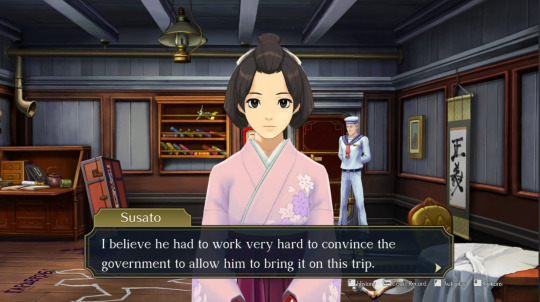
So Kazuma’s sword has bothered me since I learned that the game took place it the late Meiji era, and I recently did the research on it. And then case 2 has this line! It’s just so ridiculous when you know that Kazuma Asogi is completely breaking the law by carrying a katana in 1900 Japan.
Swords have historically been a sign of legal class divisions in Japan, and even today are highly restricted (for example current law prohibits the ownership of swords produced as modern weapons even if they’re for display purposes. They need to posses cultural/historical significance). Upon his rise, Hideyoshi confiscated all of the swords from the peasantry, and during most of the Edo period peasants could only own wakizashi (the shorter of the two swords traditionally worn by samurai). This is why daisho (set of paired swords) and especially the katana became such a symbol of the samurai class.
During the Meiji era, the Imperial Government made a point of dissolving the old caste system and becoming less “anachronistic” in the eyes of western powers. Over the course of several years, the samurai class lost their privileges and monopoly on professional military service. Samurai families became shizoku, a rank that was merely for documentation purposes. In 1876, Shizoku were no longer permitted to carry their swords. Doing so would lead to its confiscation. Swords were already banned from commoners back in 1870 after the Boshin War. Only the daimyo themselves (now part of the aristocratic kazoku with the old court nobles), military, and police could carry swords.
Given Kazuma’s theme is titled “Samurai with a Mission”, I think he’s supposed to be from a shizoku family. Which means that despite all of the actual progressive ideals he has, carrying that sword he would seem like a dissident and a reactionary. It’s also impossible for any of the exceptions to apply to him. Even if he had once served in the military (I will be making a post about conscription soon), he certainly doesn’t now. And under the revised kazoku system, it was only the daimyo and his wife that held titles. Their sons might be their heirs, but they didn’t have a rank while their father still lived. Also I think Kazuma’s parents are plot relevant anyway, so he could only be a nephew at a daimyo or other relative at best. And like obviously he’s not a cop.
And we know from the end of 1-1 that he’s not carrying a empty handle in a scabbard, or a prop weapon, or it’s been sealed in the scabbard. It’s a real, useable sword.
Ironically, it would be in London where the law would have nothing to say against Kazuma bringing his sword with him. The wearing of swords in public only became restricted in 1936. Even today, bladed weapons are less restricted in the UK than in Japan.
I just find it really interesting how TGAA has a character that’s spiritually a samurai, and rather representing being stuck in the past and unwilling to change, they’re all about good progress and change. Also it’s just funny to think of someone like the Emperor giving Kazuma or his family a “I can do want I want” permit for carrying their family sword in public. That’s the only thing I can think of that’s remotely plausible other than getting into more elaborate alt history beyond the presence of the main characters.
25 notes
·
View notes
Text
// somehow recently i keep returning to that scene where Tsukishima asked if ogata worked with (tHE HEADTOUCH...granted ogata could just be pissed off about tsurumi there tho) the hq and now that he’s proven to know russian i do wonder if he’s just in on this to get tsurumi down but
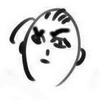
again it doesnt seem to me that he’d want it for the position though, like that whole fake flashback he made to sugimoto is littered with actual connections to ogata and his lies do have that grounding to reality (he isn’t just tearing these things from his ass!)
also why ... would he especially go after tsurumi that hard
but then again since his russian isnt standard i do wonder how he learn to speak it if he just studied or if he was affiliated with kiroranke from longer time ago
#museblather#i dont think his actions seems like they're for some super personal goal either#even if i also dont really think he's in it for... 'justice' or whatever but#?? hell if i know#there are so many leads but idk if i can connect these in the way to make sense of themdjddkdlk#also matthew (you know the apostle whose place he sat on that last supper parody) knew three languages so there were ppl saying maybe#ogataknows ainu too ?#which leads me to back to the theory i never found credible but that i entertained anyway#of him having ainu connections in family#i mean his family is likely shizokus but that could always be just from one side#??? yeah damn if i know
0 notes
Text
Hakuoki Tsukikage no Shou - Kazama Final Chapter Translation
So. [im going to swear.]
I tried doing something truly fucking insane. I wrote and copied out almost every single stupid shitty word in Chinese from the CH subbed video for this (99% of everything of this was done w/o freaking copy and pasting since it was too fucking hard to locate every stupid duplicated word that i wrote) with my mouse onto google translate (I don't have any other way to input words cuz i don't have a damn input device) before i went and translated this.
at the time i did this, writing out every stupid shitty word was a lot fucking faster than using an ocr text extractor at the time since i kept having problems with the one i was using... and my fucking gawd did this feel soooo freaking tedious and it really did hurt my hand and arm for a while.... to the point that i’ll still complain about it despite how that was done back around the time i did the tsukikage countdown video....
i fucking demand that everyone who reads this thank me for hurting myself for the sake of getting this stupid chapter translated lol... all in all, i wrote out over 4600 stupid fucking Chinese characters of this in one sitting....
oh and i think i might have forgotten about copying some of the punctuation but idfcrn.
some words/phrases i don’t wanna write in excess ever again:
1) 知道
2) 就
3) 然
4) 一族
5) 着
6) 这
7) 在
8) 我
9) 萨摩
10) 里
you guys better fucking enjoy this lol. or im going to flip a fucking table. or ten.
hahaha lol. seriously (not really lol).
on that note, i also found the Hakuoki stage play with Chinese subs but I refuse to do anything with it as long as those words aren't in text since that's more than 2 hours long, and i’m not that masochistic or insane xD. if anyone wants to volunteer as tribute though to copy/isolate the text though that’s another matter.
also i had to go read up on more damn history than i'd have liked to in order to translate this damn thing cuz i couldn't understand several words in Chinese since they were Japanese terms which made doing this even annoying since that meant extra work for me to do... and omfg i hated writing this out despite the fact that doing so did save me a significant amount of time cuz I was still pretty bad at using photoshop when i did this... though I can definitely say that this will be the absolute fucking first and last chapter of anything that i’ll ever write out again since i can say that my photoshop skills have improved enough so that i can extract text at a significantly faster pace and with more accuracy...
images used in this post were snips of the some video of the chapter aside from the last 2 which were from the cgs i posted a loooong while back.
if someone decides to repost this elsewhere, i will seriously stop posting my translations publicly (also i will curse you) :D
(p.s. i don’t have the chapter intro since that wasn’t translated for any of the final chapter tls that were posted online, and as always, edits will be done later)
Hakuoki Tsukikage no Shou - Kazama Chikage - Final Chapter
Translation by KumoriYami

Eighth year of Meiji 7th month
Six years later after what later generations would refer to the "Boshin War."
Chikage-san took me away to live at his village within the Satsuma Domain.
This is a story of what happened 5 years after I married into the Kazama family.
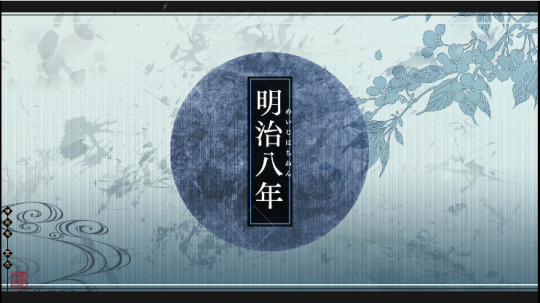
Eighth year of Meiji, 7th month

My eyes were unfocused.
I was quietly mending something——
Kazama Chizuru: That hurt......!
I accidentally hit my finger with the needle.
Kazama Chizuru:......Messed up again.
This type of housework, would usually be finished quickly....
But today my concentration, from the start until just now, wasn't here.
I know the reason why.
Kazama Chizuru: Ah......
I stopped/lowered my hand and softly sighed.
Recently, Chikgae-san has been increasing his visits to human villages.
It seems that Amagiri-san has also been frequently rushing around to collect information.
The oni in this village saw this, and one after another, they began talking about
——Soon, there will be no more war with humans.
The female oni were especially scared of war.
However I didn't think it wasn't improbable......
But there was no way to say that war wouldn't happen again.
It's hard to think that the world's become so peaceful.
When I was thinking about these things.
(door slides)
There was the sound of a door opening.
I didn't need to confirm who this person was——
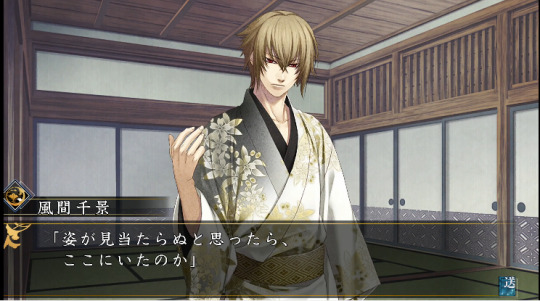
Kazama Chikage: I didn't see you, so this is where you were.
Kazama Chizuru: Chikage-san......
The instant I saw him, I immdiately felt relieved......
I couldn't help but smile.
Kazama Chikage: What is it? Is there something funny?
Kazama Chizuru: No, That's......
Kazama Chizuru: I always think it's unimaginable in how I am able to recognize you by your breathing, Chikage-san.

Presumably my answer probably surprised him since Chikage-san's eyes widened......

Kazama Chikage: Of course I am also able to recognize you by your breathing, you and I are husband and wife.
If this had been before, I probably would have immediately denied Chikage-san's words.......
Kazama Chizuru:......That's right/Is that so.
There's no need to deny anything now.
Because Chikage-san and I have already had our marriage ceremony in the Kazama village to become husband and wife.

Kazama Chikage: What are you doing here?
Kazama Chizuru: Sewing clothes.
Kazama Chizuru: If the children's clothes aren't taken care of, they might get torn when caught on a branch or from falling down.
Kazama Chikage: this sort of housework, you can just give it someone else to do.
Kazama Chizuru: But, I have happen to have time......
Kazama Chikage: Accompany me for a walk.
Chikage-san raise his chin, and spoke with an indisputable tone of voice.
Kazama Chizuru: Wait a moment, let me tie this knot......
Kazama Chikage: That thing can wait and be done later, come with me for a walk first.
Really......
Chikage-san's unyielding personality hasn't changed since [even before] we married.
Kazama Chizuru:......I understand, I'll come with you.
Anyway fighting is useless, so I followed him.
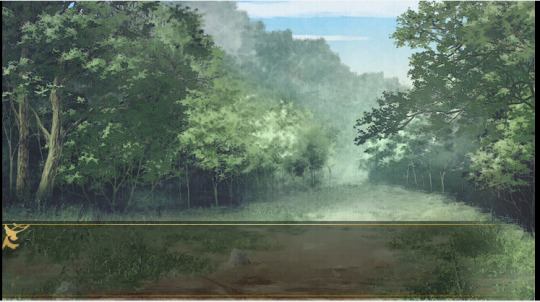
It was slightly hot when we reached the forest.
As small birds could clearly be heard chirping nearby, Chikage-san and I walked together.
Kazama Chizuru:......You seem to be so busy lately, have things calmed down yet?
I spoke to him in this way......
Kazama Chikage:............ [he sighs/breathes out here]
Not hearing my words, Chikage-san showed a distressed expression, and was silent.
Kazama Chizuru: Chikage-san....... Chikage-san.
After using a slightly heavier tone, he finally stopped.

Kazama Chikage:......What's wrong?
Kazama Chizuru: To ask me what's wrong......
Kazama Chizuru: Just now I called you several times just now and you didn't respond, it's very concerning
Kazama Chikage: So it's like that, I apologize.
Kazama Chizuru: No, I'm not upset......
Kazama Chizuru: What's bothering you?
Kazama Chizuru: If it's alright, you can talk about it with me.
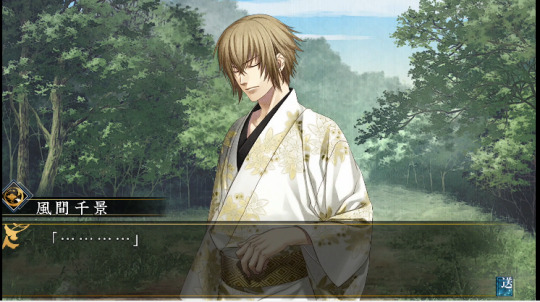
Kazama Chikage:............ [he sighs/breathes again here... this one sounds more like a sigh imo]
Kazama Chizuru: If there's anything that's difficult to talk about, I won't force you to say anything.......
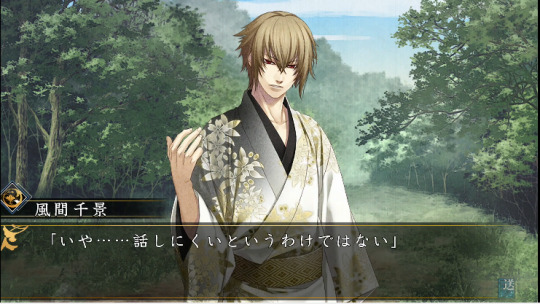
Kazama Chikage: No.......it's not something that cannot be said.
Kazama Chikage: As the leader's wife, I think you should know about this matter.
It felt like there was a different weight to the way he was saying "the leader's wife."
After moving to this village, Chikage-san has told me those words [in that manner] several times......
The subjects that followed afterwards, were matters that directly concerned the village.
As I nervously waited for his next words, Chikage-san spoke
in a solemn and careful tone.
Kazama Chikage:......There are rumours, that the Satsuma shizoku has been engaging in suspicious activities. [check audio]
Kazama Chizuru: Shizoku......?
After entering the Meiji era, former samurai are now referred to as "shizoku"......
No longer able to receive an official's salary, I've heard that they have had difficulties in securing their livelihoods.
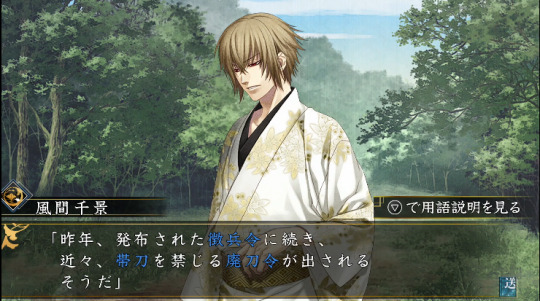
Kazama Chikage: After last year's "conscription notice," it is said that official talks to forbid carrying of blades were given with the "conscription notice."
Kazama Chizuru: Forbidding the carrying of blades? That is to say......
Before I asked my question, Chikage-san nodded.
Kazama Chikage: Banning the wearing of katana
Kazama Chikage: [Meaning] Depriving warriors of the rights associated with them.
Kazama Chizuru: Doing that sort of thing...... aren't the Satsuma shizoku unlikely to accept that?

The Satsuma shizoku were [perhaps: had been] proud to be part of the Meiji Restoration, and before I heard that it was their greatest pride.
They had overthrown the Shogunate with great difficulty, but they [however it seems that they] haven't received a decent reward [pay-off is prob more accurate]......
If they are deprived of their privileges that they had and are again forced into having difficult lives, it is obvious that there will be resentment.
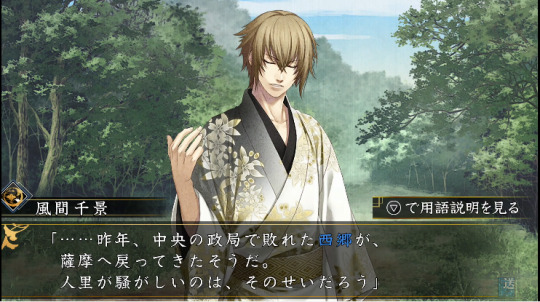
Kazama Chikage:......Last year, reportedly Saigo's defeat at the central government and his return to the Satsuma, appeared to be the cause of riots breeaking out in human villages. [refers to Seikanron]
Chikage-san's words caused me to let out a cold breath.
I've heard that Saigo is the Satsuma's most powerful individual.
If indignant warriors gather assemble together under his banner——
Kazama Chizuru: Then, where are you going [probably planning?]?
Kazama Chikage: Come on...... let's walk for a while.
Speaking like that, Chikage-san urged me......
No mater what, I wanted to confirm this matter.
Kazama Chizuru: Chikage-san......
Kazama Chikage:......Nn?
Kazama Chizuru: Will Chikage-san have no choice, but to once again move for the Satsuma?
Kazama Chizuru: Just like when the Shogunate was destroyed......
Because there is a sense of righteousness and companionship with the Satsuma [i'd assume this is more sense of gratitude and debt based on Kyoto Winds/Edo Blossoms], there's nothing to be done on the matter......
If that’s the case, I don't want Chikage-san to once again be dragged into humanity's wars.
He is my beloved husband——
we have many precious things to protect now.
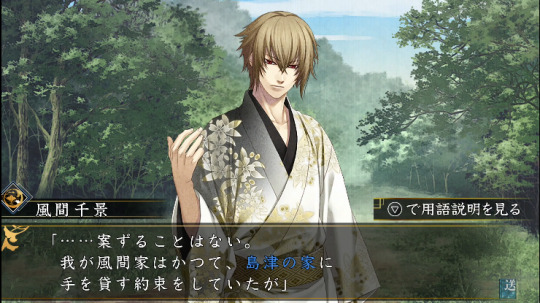
Kazama Chikage:......Do not worry, our Kazama family/clan has promised to help the Shimazu clan.
Kazama Chikage: There is no involvement in the Satsuma right now. I have no plans to be involved in wars between humans.
Kazama Chizuru: Really?
Kazama Chikage: Have I [ever] lied to you?
Kazama Chizuru:.......No
Kazama Chizuru: Chikage-san, thank you. Hearing what you said just now, I can be at ease.
Even so I felt that nothing was stronger than the promise he made just now.
Chikage-san will certainly use all of his strength to protect us.

Kazama Chikage:......Perhaps, in the near future, war may occur in the Satsuma. [the Satsuma may go to war is likely more accurate given the Satsuma Rebellion]
Kazama Chikage: In order to prepare for such a situation, [we] must consider temporarily moving into hiding elsewhere.
Kazama Chizuru:......Yes
The oni of the Kazama village...... everything must be done to protect them.
In the past my clan——the disaster that befell the Yukimura clan's oni must not be repeated.
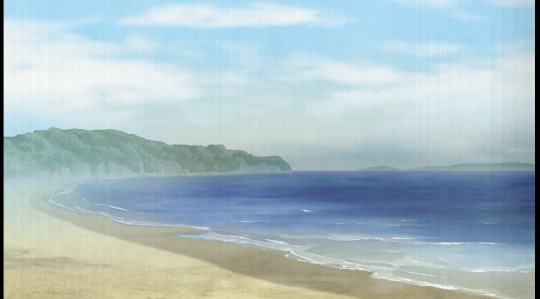
(scene changes to ocean) ~3100 words by now
Afterwards, Chikage-san and I arrived at place.......
a place outside the village and near the beach.
The deep blue sea could clearly be seen in the distant horizon, as well as the rolling waves.
It's was a symbol and scene of peace and stability.
............However.
Kazama Chizuru:......Is war really going to erupt again?
It seemed as if war would break this sea of tranquility.

Kazama Chikage: I am afraid that it will.
Kazama Chikage: But do not worry. I will certainly protect you all
Kazama Chizuru:......Nn, I believe you.
Our conversation drew to a close once more, but it didn't feel out of sorts.
The sound of the tide carried away all of my worries.
In this way, looking out towards the majestic sea......
Kazama Chizuru:......This reminds me of when the two of us disembarked back then.
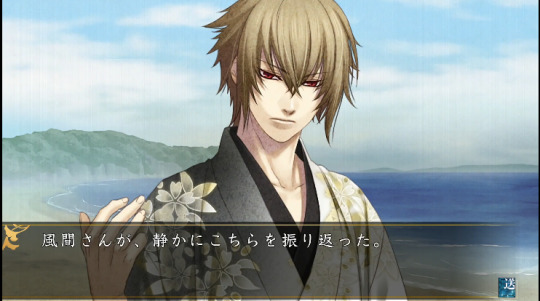
Chikage-san was quiet as he turned towards me.
His pair of red eyes looked at me, almost as if to ask for the truth of what I meant just now.
Kazama Chikage: The people [or officials?] from the Satsuma fled, similarly to how the warriors of Aizu did.
Kazama Chikage: It wasn't only the Aizu. The former Shogunate who fought the Sat-cho probably also hated the Satsuma and wanted to go to war with them.
Kazama Chikage: They were pardoned, no longer are they an enemy seeking revenge......
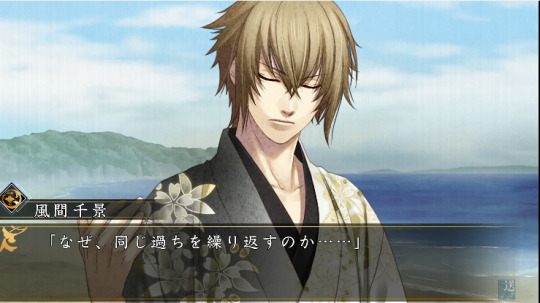
Kazama Chikage: For what reason would they need to repeat a disastrous policy/the same mistake......
Kazama Chizuru:......Yes. I also......don't understand
Kazama Chizru:......However it's already...... fighting between humans, oni must not participate again.
Kazama Chizuru: That's what I think, ever since I chose to live here as an oni.
Kazama Chizuru:.....Yes. Even though——
Kazama Chizuru: Even if there's a new battle, the surviving members of the Shinsengumi might take part in it, as will others who are the same——
Among them, I heard that some of them had been pardoned.
That possibility of that is entirely possible.
But——
I've truly observed the conclusion to the Shinsengumi's existence.
They cannot be involved, they can no longer live while fighting against the trajectory [of history? alt:against the flow/tide]/
They can't——it's not possible for them to get involved again, and they can no longer survive against the tide.
Right, though it's difficult to say that/sorry/sad to admit to that.
Kazama Chikage: In front of me, you don't need to be strong [put up a brave front]
Kazama Chizuru:......It's alright. I'm not trying to be strong.
Kazama Chizuru: It's true that I have nothing to do with the Shinsengumi anymore——
Kazama Chizuru: Because of that, there have been things [that I have] obtained.
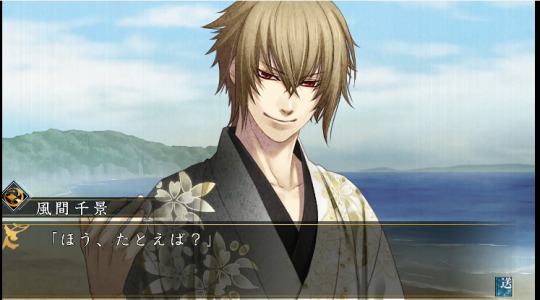
Kazama Chikage: Oh? Such as?
Kazama Chizuru: Yes......
Options

(Choosing to live together with you)<---
(Understanding how samurai/warriors chose to live)
Kazama Chizuru: Your...... being at Chikage-san's side, it was my choice.

Kazama Chikage: Usually you're only complaining, today you're being quite frank.
Kazama Chizuru: Com-complaining......! I didn't say [anything like] that.
Kazama Chizuru: You and the children never listen and don't even know it......!
I tried to argue——
Kazama Chikage: No need to speak. Come.
He took me by my arms then held me tightly.
Kazama Chizuru: Ah......!
There wasn't enough time to respond since I was confused, and he grabbed my chin [face/cheek looks to be more accurate] with his fingers.
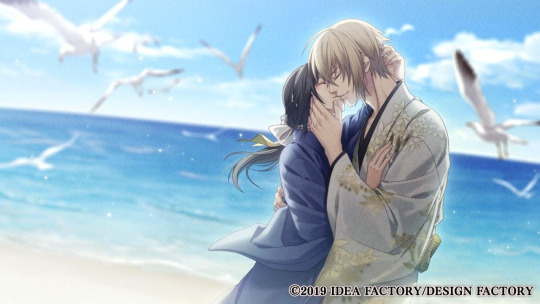
(Kazama's kiss with Chizuru cg 1)
Kazama Chizuru: Nn......
It was like saying that everything I was belonged to him, as he gave me a fierce kiss.
I also used my lips to respond to his warmth.
Kazama Chikage:......You don't need to be worried.
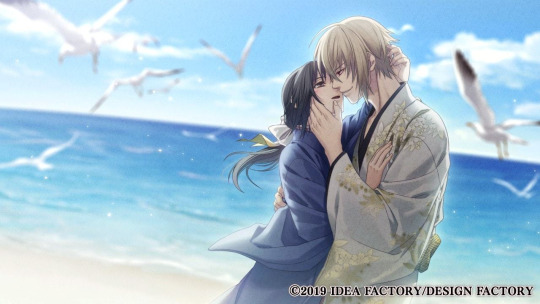
Kazama Chikage: Even if the Satsuma ['s lands/domain] becomes a battlefield......
Kazama Chikage: I will do everything to protect you, the children, as well as the village's oni.
Although he spoke in a natural tone......
He however was shouldering the fates of me and the children, and of the entire clan.
[To be the one] dealing with this huge amount of pressure, I couldn't imagine it.
Kazama Chizuru:......I will support you.
While living as a human, then recalling the everyone from the Shinsengumi, I feel sad, although there are times
[Although there are times I feel sad when I think of when I lived as a human, and recall everyone from the Shinsengumi......]
But I, have chosen to to support him on this path.
Kazama Chizuru: As a wife...... as an oni, I will do everything to support you......
So, as long as I'm alive, I will always support him.
Kazama Chizuru: Ah. Please stay at my side. You absolutely will not regret it.

(kiss cg 1 again)
——He never broke his promise.
Chikage-san will stay with never go against this agreement, and will stay with me for a lifetime.
So I shall make a promise to him here.
Kazama Chizuru: I will forever be at your side......
——This is the promise of an oni.
——Tsukikage no Shou Kazama Final Chapter End——
maybe i’ll go translate yamazaki’s final tsukikage no shou chapter... in like 2 years. or something. if someone hasn’t done it by then. lol. unfortunately, tsukikage is not on my priority list since 95% of what CH TL I’ve seen is only available as videos... and while I’d very much prefer to translate Saito’s ginse no shou route, the only thing that I’ve found with CH TL so far is a short clip from the 2nd common route chapter.... plus, i still have ssl to worry about... and even then, there are some dramas that i really wanted translated along with the rest of kyoka-roku...
final edits will be done when i start caring about them... later.
also this is chapter 8 for kazama’s route. each route in tsukikage and ginsei no shou has their own unique ending music.
p.s.s. i always love to complain about unnecessary extra free labour.
42 notes
·
View notes
Text
Kamiya Dojo Monogatari Tales 17 (JUMP SQ)
About Kamiya Dojo Monogatari:
Tales of Kamiya dojo is written by Kaoru Kurosaki and published along with the “Rurouni Kenshin Hokkaido” arc in JUMPSQ. The tale involves the Rurouni Kenshin character in daily life that takes time between Kenshin and Kaoru marriage until the epilogue chapter in the original manga before the Hokkaido Arc. Until this month (April 2022) there are a total 53 chapters in Tales of Kamiya dojo. This is an unofficial translation.
Previous Story: https://kenkaodoll.tumblr.com/post/680506843657797632/kamiya-dojo-monogatari-tales-16-jump-sq

“Here you go, you two.”
Arriving at Kyoto Station, Yahiko and Misao received *nigirimeshi wrapped in bamboo bark from Omasu, who was waiting for them. They didn't tell her that they were going to take the steam train from the station, but she read their behavior completely.
“Misao-chan likes that vehicle, so I’m sure you’ll come to ride the steam train.”
“Hehehe. I guess they know.”
Misao laughed a little embarrassed.
“Everyone at the Aoiya has to work so they can’t send you off, but take care.”
“Yeah, thanks.
The nigirimeshi that Omasu handed was still slightly warm, even through the bamboo bark wrap.
“Okina was against going to Yokohama, but he didn't mean to be unkind about it.”
“I understand. Okina said to me, 'What if you go after Aoshi again like you did last year and get into danger?' But you know, even if I am in danger, I have trained myself well enough to get through it. Besides, I have Yahiko with me."
“Eh, me?”
“Don't tell me you haven't been working out and getting stronger than you were last year?”
“Idiot. Of course I haven't neglected my training. You saw my match with Aoshi at the Gekikenkai, right? Aoshi praised me at that time.”
“Aoshi-sama! Praised! At the Gekkenkai!”
As soon as Misao said it, she crouched down on the spot.
“It’s good.”
She sulked, writing the character for "no" on the ground.
“I haven't gotten many compliments either.”
Her lips are pouting.
“When he was at the Gekikenkai, he didn't even tell me that he was competing.”
Her voice is getting lower and lower.
“Wasn't that a mission? There were some things he couldn't tell, because you are his relatives. You know what they say, "To deceive your enemy, start with your friends."”
“....Yes. But he was cheered on by girls.”
“It's part of the mission.”
“How is that possible?”
Misao stood up vigorously and faced Yahiko.
“Right?”
“I can't stay away from the thought that I might be on a mission, entering all sorts of places, and being irresistible to girls in places I don't even know about! Let's go to Yokohama as soon as possible.”
Misao started walking strongly with big steps. Then she turned around.
“I'm off Omasu-san, I'm going to buy souvenirs for everyone!”
She waved his hand in the air.
“Have a good trip!”
Omasu sent her off with a smile.
・
Yahiko and Misao quickly boarded the steam train. The trains were divided into upper-class, middle-class, and lower-class trains, and since they did not intend to be extravagant, they boarded the lower-class train. Looking around the cramped interior of the car, they saw an old lady with a birdcage. She stood out even if she didn't want to because she was carrying such a thing. Yahiko wondered why she was riding the land steam with a birdcage. When Yahiko wondered, Misao shouted.
“Oh, Auntie Oshige!”
“Oh, Misao.”
Apparently, they knew each other.
Misao immediately sat down next to the lady. Yahiko also sat next to Misao across the aisle.
“She is Aunt Oshige, she runs a store called Tsubaki Teahouse. She's been taking care of me since I was little."
Misao introduced the old lady to Yahiko.
“Yahiko Myojin, a Tokyo Shizoku.”
“"My goodness, you've come a long way.”
The lady gave Yahiko a light bob and then spoke to Misao.
“It's so unusual to meet Misao here.”
“Yes, I'm going on a trip. Where are you taking the pigeons, Auntie Oshige?”
Yahiko thought it was just a birdcage, but upon closer inspection, he saw that it contained two pigeons.
“These kids are Ru number one and number two.”
“So these are the kids who are coming back to the Aoiya.”
Misao poked her finger into the gap between the birdcages and patted its chest.
“What the hell are you talking about?”
Yahiko could not read the conversation at all.
“Oh, I'm sorry, I'm sorry. Auntie Oshige is a former member of the Oniwabanshu.”
“!”
Suddenly, without any context, Yahiko was truly surprised.
At first glance, Aunt Oshige looks like any ordinary woman, with a head of gray hair tied into a round topknot that is typical of elderly women. If he were to venture to describe her features, he would say that she has a sense of cleanliness, as she seems to be running Aoiya. However, this is also the case for most of the ladies of ordinary Aoiya. It was not that special.
This ordinary lady was a former member of the Oniwabanshu.
She did not have the "unusual" feeling that he had felt from Aoshi and Okina. Although the other members of the Aoiya were not as strong as Aoshi and his companion, he felt that there was something special about them.
But Aunt Oshige was, from all appearances, a perfectly normal person.
“Oh, It’s okay to speak about Oniwabanshu”
“It's all right. Yahiko protected Aoiya with everyone else during the big fire last year.”
“That's great. Thank you very much.”
“Oh, yeah.”
Yahiko was embarrassed by the aunt's deep bow and involuntarily stammered.
“This pigeon is a carrier pigeon.”
Misao explained to Yahiko.
“There are a total of 141 pigeons in the entire Kyoto area that are assigned names from Iroha group number 1 to 3, and they can literally communicate at the speed of a flying bird. There was a time when Iori at Arai Seiku's place was harmed by Chou, remember? At that time, it was Ru number one here who carried the critical news to Kenshin who was at the Aoiya. If it wasn't for it, what would have happened to Iori?”
As they were talking, the land steam was moving.
“How can such a fast pigeon be riding on a steam train? In all likelihood, a flying bird can fly faster than this hunk of steel, right?”
When Yahiko expressed his doubts, the old lady began to talk as if she had been waiting for him.
“Some pigeons can go back and forth between two fixed locations if they are trained, but in our case, we keep them in a one-way direction, so that they can go in all four directions. So, we are about to hand-carry the birds to Osaka, then they know how to return to Kyoto. That kind of transportation is also an important part of our job as Oniwabanshu.”
“What? But until now, we've had an information transmission network throughout Kyoto, and now you're going to reach out to Osaka?”
Misao asked in surprise.
“I'm sorry. I don't know all the details.”
The old lady apologized to Misao, whose eyes sparkled as if she wanted to know what was going on.
“Let's just sit in the steam train and fill our stomach.”
The old lady said, and took out a rice ball wrapped in bamboo bark from the wrapped cloth.
“Ah! That!”
Yahiko couldn't help but let out a loud cry.
It was the same one that Omasu had given them earlier. The old woman probably had been ordered by Okina to carry a carrier pigeon to Osaka.
The aunt said she did not know the details, but with this nigirimeshi, Yahiko understood somewhat.
The Fujita group, which was at the center of the case that Chou and his team were pursuing, was an Osaka based company. And at one time, Aoshi was suspected to be involved in it. In case something happened in Osaka, Aoiya would be contacted immediately. Normally at the Tsubaki teahouse, there were three pigeons that came back to the Aoiya.
But they decided to send two of them to Osaka to communicate. Probably Okina was quite worried about Aoshi.
Nevertheless. Yahiko was surprised to see the former members of the Oniwabanshu being mixed up in the city like this. From a dangerous bouncer like Aoshi to an expert in treating guests at a high-class Japanese restaurant like Okina. At the end of the day, there are too many people, even ordinary people like the lady in front of me.
Yahiko, Misao, and the old lady said things like, "There's nothing like eating nigirimeshi while watching the scenery fly by in the steam train!", "It's softly made, but it doesn't spill at all, it's delicious!", "Aoiya uses high-grade rice," and so on. They were enjoying the trip by steam train in a lively atmosphere and they arrived in Osaka.
・
When Yahiko got off at the platform of Osaka station, this time he saw someone familiar to him.
It was that eccentric, logical person dressed like a student. It was Inoue Enryo.
“Ah? What are you doing here?”
Enryo noticed Yahiko and the others and immediately came over to them.
“No, what are you doing here?”
“I'm here to investigate the steam locomotive of the supernatural *tanuki.”
Steam locomotive of supernatural tanuki.
“What was that?”
Misao looked at Yahiko curiously and asked him.
“When I met this guy at Shinbashi station, I think he was saying something. He said he was looking for witnesses who had seen a tanuki disguised as a steam locomotive.”
“Yes! Yes, sir, the lady over there with the birdcage, do you know anything about it?”
Enryo quickly asked Aunt Oshige.
“I don't know. I've heard stories about tanuki that turn into beautiful women, but I've never heard of one that turned into something as big as a steam locomotive.”
“I see… I've done a lot of research in the *Kansai region, but I've come up empty everywhere.”
Enryo looks disappointed.
Aunt Oshige lightly bowed to Misao and Yahiko and walked away. In the meantime, an old man passing by called out to Enryo.
“Oh, young man. I've heard that story before!”
“Where did you get that? Haven't you seen it?”
Enryo's eyes lit up.
“I have never seen it. I heard it from you yesterday.”
The old man said so and went away laughing. It seemed that he was simply teasing him.
“He was just teasing me. I see. Maybe it's not the right time to do this investigation.”
Enryo mumbled ruefully.
“You are a student at the Tokyo University Preliminary Entrance, aren't you? What are you doing here?”
Yahiko involuntarily asked.
“What do you mean? I'm doing research on *yokai. Didn't I tell you?”
“Research?”
“Yes.”
Enryo said to the surprised Yahiko as if it was very obvious.
“There is a mountain of research lore from ancient times, but it differs considerably between *Kanto and Kansai. So now, I have come to investigate whether this new yokai, "Supernatural steam locomotive Tanuki," which has arisen in this civilized world, is also occurring in the Kansai region at the same time. But so far, this yokai that occurs in the Kanto region has not been seen in the Kansai region. This means that the supernatural tanuki is a new yokai that is unique to the Kanto region. However, since I have not seen the yokai myself, I cannot dismiss the possibility that it is just a big talk in the Kanto region.”
“…”
Yahiko was overwhelmed by Enryo's fast-talking. This guy is like the Hiten Mitsurugiryu of words.
“What are you and Yahiko doing in Osaka?”
“I was helping out a store in Kyoto, and I'm on my way home now.”
“I'm going to Yokohama.”
Yahiko and Misao both replied.
“By boat?”
When Enryo asked them this, they nodded.
“Then, as they say, the journey is the companion, so why don't you join me on the way to Yokohama?”
“The story about yokai sounds interesting. Okay!”
Misao was the first to agree. Yahiko also did not object, and thus the three of us decided to travel together.
Notes:
*)nigirimeshi: riceball
*)Gekikenkai: Kendo style match
*)Shizoku: social class from samurai family
*)When I met this guy at Shinbashi station: refers to Tales 8
*)Tanuki: racoon dog, a shapeshifter in Japanese folklore
*)Yokai: ghost, supernatural entities and spirit in Japanese folklore
*)Kansai: Western Region of Japan
*)Kanto: Eastern Region of Japan
.…..continue in chapter 18……
https://kenkaodoll.tumblr.com/post/681148907275862016/kamiya-dojo-monogatari-tales-18-jump-sq
TLnote(1): translating Japanese is so hard because the sentence structure is very different compared with the English also the style of writing is different, plus there’s a lot of figurative, poetic language and things that sounds not making sense if it’s directly translated into english. So forgive me if this is very weird to read, and please tell me if you want give corrections.
TLnote(2) I will provide the original Japanese text for correction if any of you who read have better knowledge of Japanese language. Just dm and I’ll send the file.
TLnote(3) Dtninja had translated some earlier chapters in his website. You can go and check on there.
#Kamiya dojo monogatari#tales of kamiya dojo#rurouni kenshin#ruroken#unofficial translation#kaoru kurosaki#kurosaki kaoru#Myoujin Yahiko#Makimachi Misao
6 notes
·
View notes
Text
¡Hola Mundo!
Quien Soy
¡Hola! Soy Santiago, game designer en Rushing 2600 y este es mi primera entrada a mi primer blog. Espero que sea igual de divertido para ustedes leer mis balbuceos escritos como para mi escribirlos y que este sea el inicio de una larga serie de blogs donde espero que todos se prendan a escribir unas líneas sobre el proceso creativo en Rushing.Primero, un poco de la infaltable presentación de la “maestra”. No me interesa desplegar el papiro del curriculum porque la verdad no lo tengo. Solo soy un gamer de toda la vida al que siempre le entusiasmaron los juegos, la tecnología y fichinear.
Rushing2600
Durante el 2019, me acerque a un evento organizado por Game Jam Argentina y jugué al Shizoku: Shuriken Brawl, junto a 2 de los desarrolladores que estaban ahí. Me contaron un poco del juego, de lo que hacían y me dieron su simpática tarjetita. Rushing 2600 se llamaban. Shizoku me había parecido entretenido y una buena idea, y yo estaba con ganas de participar en un proyecto, así que les escribí.
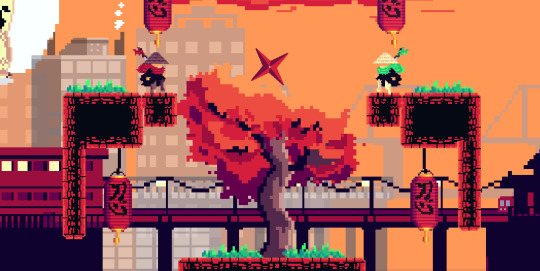
Luego de una “entrevista” con Manuel (fundador y CEO), donde más que entrevistarme fue charlar sobre los videojuegos que nos apasionan, me dio la oportunidad de unirme a Rushing en el juego que estaban pensando.
Sagitta Infernum
Apenas entré me comentaron sobre el nuevo Proyecto. Tenían 3 cosas en claro:
La Ambientación
La premisa básica sobre la que se iba a desarrollar todo
Un inicio de historia
Con eso fue que empecé a trabajar. A medida que avanzábamos iba discutiendo algunas ideas que se me ocurrían con los otros chicos y de a poco fuimos tomando unas y descartando otras.
Armé varias cosas que quedaron colgadas, al menos mientras no eran prioridad para un primer demo que se iba a armar. Y siguen ahí, esperando su turno. Pero eso sí, anotadas y debidamente documentadas, sino con los meses las ideas se pierden.
Durante los meses anteriores a fin de año, los chicos estuvieron trabajando en mejorar y pulir su anterior Shizoku, por lo que el avance sobre Sagitta (en ese momento conocido como Project Alighieri) se detuvo. Pero no, la mente de un designer no para. A veces estaba en el subte yendo a mi trabajo de todos los días e inconscientemente me ponía a pensar en una habilidad, en una mecánica, en un ataque de un enemigo, en un detalle de la historia. Uno, de alguna manera, va masticando las ideas hasta que evolucionan a algo potable.

Cuando me comentaron los 3 puntos sobre los que se basaba Sagitta Infernum, al principio había cosas que me chocaban. No estaba del todo seguro hacia donde apuntaba, algo normal creo yo cuando uno no es el dueño de la idea original que impulsa todo.
Pero con el tiempo adopté el concepto y Manuel me martilló su idea hasta que empecé a quererla. Y hay algo sobre lo que me hizo hincapié varias veces que eventualmente entendí y me abrió bastante las puertas. Él quería que yo sea el Lead Designer y delegarme la palabra final en cuanto a decisiones de diseño. Obviamente que todo se habla entre todos y hasta el artista da su opinión sobre una mecánica que no le gusta, como así nosotros le decimos que uno de sus sprites apesta (cosa que nunca pasa).
Esta libertad es la que me hizo dar cuenta de que los 3 puntos son una guía, no una restricción. La ambientación está para expandirla, la premisa básica está para explorarla y ver hacia donde te lleva y el inicio de historia está situarte en contexto y no para guiarte paso a paso en absolutamente todo lo que tiene que pasar.
Así fue como un enemigo, Cerberus, fue mutando desde la clásica visión que se tiene de este personaje mitológico a algo mas propio, más Sagitta Infernum!
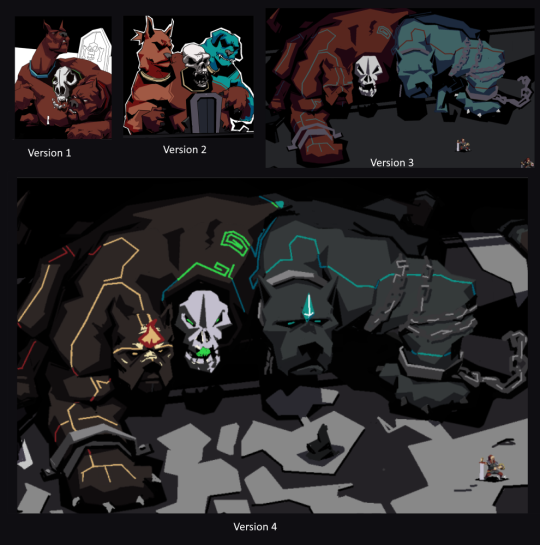
Empezando a Diseñar
Es una de mis primeras experiencias diseñando, y por suerte viene siendo algo de lo mas enriquecedor. Pensar, flashear, crear y ver un juego en la cabeza antes de escribir la primera línea de código es de lo mas divertido y desafiante también. Y con el correr de los días, las semanas y los meses ver una idea, que hace no tanto era solamente eso, una idea, convertirse en una build donde aunque sea moves al personaje y mas tarde convertirse en un juego, es maravilloso. ¡Y espero que salga bien!
Al menos espero que salga mejor que estas palabras desordenadas que escribo como primera entrada al blog. Prometo un texto cada seman… 2 semanas.
En la próxima entrada quiero hablar de como pequeñas decisiones cambian completamente el flujo de un juego, convirtiéndolo en algo completamente nuevo. No hace falta reinventar la rueda siempre, pero a veces con agregar un detalle, el cambio es rotundo. Y si no, de alguna otra cosa
¡Saludos!
#spanish#gamedesign#SagittaInfernum-Game#game development#indiedev#arte#art#videojuegos#desarrollo de videojuegos
2 notes
·
View notes
Text
Saitou Hajime's First Wife Shinoda Yaso
Written by Kizu
Thursday, 27 July 2006
Part I - Early life in Gonohe Tonami
IMO Shinoda Yaso is probably one of the most elusive figures in Fujita Goro’s life. As we all know Fujita Goro is Saitou Hajime. Not many people have heard of Shinoda Yaso until recently and some may not have heard of her at all. A long time ago I found her name in a –favorite- site of mine 3-hajime.com now known as http://hajime3.hp.infoseek.co.jp/ . Nowadays I don't heavily rely on websites but I still do like that one. The problem was usually I'd only find very short blurbs on Yaso. Anyway, not much is known about her still but let me tell you about her as I’ve finally deciphered some info from Rekishi Doukohon, Saitou Hajime Subete and Saitou Hajime no Nazo.
Shinoda Yaso was of samurai lineage, if we recall only samurai lineage had the right to keep a surname but her evidence of being of samurai ancestry is evidenced by her father Shinoda Naizo who was an Aizu Honshizoku (warrior group). Before the fall of Aizu and the displacement of the Aizu han, her father was receiving a stipend of 400 Koku and their residence was at Yoneshiro Ni Choume (2nd district I think). Her father died of illness while her eldest brother "Iwagirou" died in the Kinmon incident. Many people including Saitou moved to Tonami – Aomori (northern Japan – Shimokita peninsula) as refugees, she was one such person who moved along with her brothers to the house of Shichiro Ueda in Gonohe village.
Saitou after his release from the Takada clan - Echigo, proceeded to Tonami under the name Fujita Goro in the year 1870. It is recorded that most of the immigration was completed by June, although I’m not sure when Saitou actually reached Tonami, all we know is the year. Kurasawa Hieimon (sometimes I got “Heijiuemon”) was an advisor/councilor and directed the immigration of the POWs. He and Saitou were acquaintances from Kyoto, which probably explains why Goro came to stay at Kurasawa’s household. It’s important to note that not only Saitou stayed there but many other people, aside from Tokio whom Kurasawa had adopted prior to going to Tonami. Yaso met Saitou around February 1871, most probably because of Kurasawa since Kurasawa was the one who arranged/sponsored their marriage. Saitou married Yaso on August 25, 1871 the very day that he was scheduled to go to Tokyo to guard Matsudaira Katamori. Many other Aizu soldiers accompanied Matsudaira, they left to start the abolition of the Tonami clan. To be honest I found this to be quite funny as it’s like a soldier marrying his sweatheart just before he goes away. But as to why he couldn’t wait till he got back, I have no idea. LOL. It’s probably just me.
So after their marriage, they setup house in Gonohe-son 132 residence. The address of Kurasawa as Saitou was already living there. They were married by self-declaration under the term “Shizoku”, meaning of samurai antecedents but really their life was more like “merchants”. It is during this time that the life in Gonohe was very hard, it was hard to harvest and develop any type of industry as Tonami is described as a barren land. The settlement most probably according to Subete did not face the sea and thus fishery was not an option. Saitou according to Akama “peddled” (yes the work of a merchant) but I’m unsure as to what. Saitou and Yaso’s life were seriously poor and there was a lot of death from malnutrition and the harsh elements. It’s said that during the time 10% of the immigrants were sick and it got so bad that the Meiji government was forced to send them some “relief” money.
The truth of Yaso’s existence is when Akama was looking over the Kansoku register (scholars agree that there are many mistakes in this register. I think it was also called “Jitsuru”)... In January 1872 a population census(Kansoku register) was required by the Meiji government and her name and Fujita Goro’s came up. In Fujita Goro’s family registry, it is recorded “Fujita Goro 27 wife Yaso 31. 132 residence”. There is a mistake here in that Yaso is said to be born in 1842 this means that Goro should’ve been born 1846 but we all know he was born 1844 January 2, via his record in the Police Department Bureau (later known as the TMPD) Akama had written that there was a woman who was able to enter a girl’s school with Yaso’s help. She mentions that this woman is still alive albeit –very- old. She is a master in calligraphy. The name is not mentioned from what I see (If I just missed it please let me know). Our last record of Yaso is that she moved to 269 residence Gonohe-son on July 20,1876. This was the address of Kurasawa Jikan 78 yrs old, who at the time was living with his son (Hieimon 47 yrs old –mentioned earlier) and Jikan’s wife 71 yrs old. What she did afterwards is not yet known.
Part II - Relations and Parting
This is a continuation of the prior post where we left off with Yaso’s existence as a real person. BTW the Jitsuru above is actually Jinsaru register.
According to Shizuko Akama there is the possibility that Fujita Goro (Saitou) was already working for the Police Bureau as early as 1871. It is commonly thought of that Kawaji Toshiyoshi from Satsuma was probably connected to Goro’s entry into the police because during the time he was recruiting former Samurai to hold public positions, but the definite record we have of Saitou joining the police is his record where he got sent off to the Seinan war, otherwise known as the Southwestern Rebellion under the police and not the army.
Anyway during the time he and Yaso was living with the Kurasawa, he also helped setup a school. I’m not sure if this is the same school that the girl whom Yaso helped went to. Saitou also headed the penitence group on the same day he and (presumably) Yaso changed residence on February 10, 1873. The reason for the relocation was because Kurasawa and his family, which I would guess includes Tokio had also changed residence.
Goro and Yaso would then live at 812 residence at the Ueda household. This was the same house that Yaso lived in prior to marrying Goro. It is described as “tenement” style. The question comes to mind is why would Goro and Yaso move in Ueda Shichiro’s house? How did they secure residence there again and why did they not live with Kurasawa? The answer here I think can be found by examining Yaso and Kurasawa Hiejieumon’s relationship to the Ueda house. Yaso had already been living at the Ueda house so there’s no surprise there, however it is mentioned that Kurasawa himself was an adopted son of the Ueda’s. This would explain Kurasawa’s connection with Yaso, and why he would sponsor the marriage between the two. Kurasawa also would’ve been able to secure lodgings for Goro and Yaso once again into the Ueda house. It is not mentioned why Kurasawa would opt Goro and Yaso not to move in with them at Kurasawa's new residence.
Sometime after this, Takagi Tokio, Kurasawa’s adopted daughter is sent to Tokyo. The reasons are unknown. After over a year of living in the Ueda house, Fujita Goro goes to Tokyo on June 10, 1874, the reasons for Goro’s arrival in Tokyo is unknown as well but Akama seems to think that Goro has been in and out of Tonami several times. Anyway Goro eventually marries Tokio. The marriage arrangement between Fujita Goro and Tokio is thought to have been made in fall with Sagawa Kanbee (Kambei? and Yamakawa Hiroshi as lower go-betweens and Matsudaira as higher sponsors.
What can I tell you about all this? Nothing really that you don’t already know since I basically spilled everything. LOL. There was a theory that came out because of rekishi dokouhon that made it look like Saitou divorced Yaso and that perhaps Kurasawa had a hand in it. Please note that I have not read Rekishi Doukohon personally (but I did get a copy of it so I might update this with corrections or something). The theory went something like, to spare Tokio from further “hardship” her adopted father had arranged things and that the marriage of Saitou to Tokio was done even before Saitou went to Tokyo. With the relationships as it is, I sincerely doubt Kurasawa would request such a thing considering they had already lived in Tonami for quite some time plus why would he break up a marriage he sponsored in the first place? Much less a marriage of a woman whom Shichiro Ueda took into his care, remember Kurasawa was adopted into the Ueda house. Tokio had already been living in Tokyo earlier before Saitou got there, so that pretty much throws out the idea that the marriage was encouraged so that Tokio can be taken away from the harsh life in Tonami. All of this came from the assumption that Kurasawa wanted to safeguard his daughter, which is why Kurasawa took Yaso in eventually out of “guilt”, but considering the fact that the clan had already been pardoned and some had left Tonami much earlier… And anyway why pick someone who was already married to someone else? Simply to me this whole theory does not make any sense.
There is another “theory” that Yaso died from harshness in the life of Tonami… I am not sure where this theory comes from, although sometimes it is cited that there is no record of her after 1876 where she moved back to the house of the Kurasawas… I have not heard of accounts of her being fragile and just because one stops being on someone’s family register does not mean they died that year. It is possible she "relocated" and from what I know family registers are changed many times especially when living in a new area. And even if she died that year, that’s still two years from the time Goro left so it does not explain the separation.
From what I read though, researchers are not certain of what happened in between the time Saitou (Goro) left for Tokyo and he got married to Tokio. They are asking the question did Goro abandon his first wife? Because there is no divorce papers and the fact that Yaso at the day he left for Tokyo, saw him off, most probably indicates that she had no idea she would never see him again. I think the question is what happened –after- Goro arrived in Tokyo. It wouldn’t be uncommon to think that Goro would visit Tokio, considering he was good friends with Kurasawa. It’s not even unfair to think that Kurasawa himself might’ve asked Goro to visit Tokio from time to time to make sure she’s okay. What happened in between… I don’t know.
I’d like to think just like Akama that Saitou was not a cold man… Akama even goes on to theorize that Saitou might have made Yaso his mistress and might’ve participated in his work in the Police (remember she is also the one who theorizes that Goro has been working for the police as early as his Tonami days). I must say though that perhaps that’s just a way for Akama to reconcile this rather puzzling event. It’s very much like when one assumes Yaso dies of illness, was a bad woman or cannot bear a child… Or that Tokio was clearly the better choice. The list goes on really on how and why Saitou would -presumably- "abandon" Yaso but the truth is we don’t know –yet-.
1 note
·
View note